#i did not pick wwi thinking it said wwii
Explore tagged Tumblr posts
Text
*sighs* i picked the 40s
#to clear this up#i am white#and i was making a self deprecating joke#about how watching captain america is the reason i got into wwii history#not trying to condescend to anyone#at no point did i say poc can’t be interested in wwii#i am genuinely sorry if you thought that’s what i meant#i went to a college in the south with a supermajority of white students because they gave me great financial aid#so only a few of my friends are people of color#i didn’t want to generalize about poc interests#especially not in a joke#hence my saying ‘young white people’ instead of just ‘gen z’ as a whole#i did not pick wwi thinking it said wwii#i picked the 40s because i am very interested in wwii and have actually done independent research on the subject#i’m not limiting the 40’s to wwii#that’s just the part of the decade#that i personally am most interested in#my favorite book i’ve read about the war is ‘a woman of no importance’ about the spy virginia hall#recently i’ve gotten interested in the african front#because it was glossed over in school#unlike the european and pacific theaters#i have observed my dad and a lot of his friends who were born in the 50s#discussing books about the civil war on a consistent basis#and i thought it was interesting that my friend groups’ interests mirror that#it’s cool to wonder if gen alpha might develop an interest in the korean war or vietnam war#(vietnam also interests me a lot)#it would’ve been very nice to talk about our shared interest in the world wars#the genocide conventions sound fascinating
163 notes
·
View notes
Note
Hiiiii
I saw your added tags to that post about nuclear testing in Algeria, and honestly I’m just genuinely curious as an Algerian, but what do they actually teach you about Algeria? Like this is genuine curiosity and not trying to stir any pots
You can absolutely skip this ask if ur uncomfortable with it btw! No hard feelings at all, again, it’s all just curiosity
(*Sigh* Yeah not gonna lie I've been debating about answering this. It's not being uncomfortable that scares me Anon, far from it. It's the clowns I'll have to deal with afterward that worries me. But this needs to be said.)
Not much.
But it could be because I didn't grow up in France. I grew up on an old colony of France, Réunion Island. Because our educative system tends to be selective about the subject we have to learn depending of where we live. So it might be part of the reasons I was taught so little about the subject.
For example : I am a french white woman who's been taught at school about the extensive damage of French Slavery. Because it was part of my island's History. But most of my countrymen who grew up in France don't know about it. They just know it happened and that's it. I have to explain to them why it was really fucked up all the time. It's possible quite other french people are more aware of what happened with Algerian War than I am just because of where they lived when they were taught on the subject.
So understand that what I am giving you here is my personal experience and and isn't necessarily representative of everyone's experience when it came to learn about Algerian War. Now this is out of the way, here's how I learned about it. In 2008, which is the year I passed the second part of my Baccalauréat (aka the Bac aka the final boss of exam of public school in France for those who don't know), I learned about Algerian war. Barely.
See the thing is, all our History lessons during the last year before the Bac is about WWI and WWII. We especially study the fuck out of WWII. During the whole year we had to learn extensively about it. And being the main subject of the exam, the teacher made more time to make sure we knew about it than anything else, thus…We went quickly on our lessons about the Algerian war.
I just remember that people were torn about General DeGaulle's actions during that time and that it was a war of independence. We didn't study any of the battles. I think. If we did it probably was mostly dates rather than about the events (and I'll admit this, I'm shit at remembering dates) We didn't learn about the Gerboise Bleue. And that I am sure because this would have stayed in my mind. Why am I so certain I'd remember ? When we were taught about what happened in WWII about Hiroshima, we were taught how it wasn't ok. That dropping a bomb on a country full of civilians was terrible. I am quite certain me and my classmates would have picked up on the HYPOCRISY if we were told about the Gerboise Bleue right after. And that was in 2008. I heard that they're simplifying the lessons more and more to avoid having too many students to repeat years. I am not even sure they're even teaching about it now.
So there you have it. I wasn't told about it. School didn't really talk about it. And my parents and grand-parents didn't talk about it. And my generation isn't going to talk about it to their children because they don't even know about it. And even in my case, I don't know where to look to learn. The sources I've founds on the Gerboise Bleue are...Limited and frankly I don't trust them.
#Alésia ? Connait pas#I'm switching off anons in case of pigs#sorry about that folks but I ain't risking it#I shared my experience on the subject and my feelings about it#you do you#I will mute this later if it explode#war#politics#I guess#France
5 notes
·
View notes
Text
What if the BSD Great War...
So while doing some digging around while working on one of my many analysis projects…my brain began to create a weird rabbit hole theory that seems so crazy but it could be like 10% possible.
As we all know as members of this fandom, there was “The Great War” that occurred 15 years before the start of the running manga. Yet, we are given such little details about such a detrimental event for multiple big-name characters within the series. It makes me question why this might be the case. While I can't pick apart Asagiri to the point where I can figure out his own personal crazy thinking, I can theorize the plausibility that this war was based on a real-life historical event, given the fact that a good 90% of our cast was real people as well, with their BSD relationships reflecting large similarities as the real-life relationships between the authors.
Now that is said, here is what i came up with…WHAT IF this war we speak off is a odd play off World War II.
Don’t throw me to the wolves here, I have no clue if anyone else has thought this either… But hear out at least my breakdown:
Evidence piece number one: Basically as mentioned above, Asagiri uses historical authors and plays the switcheroo game, religiously.
What started as me just trying to figure out what chapter Yosano’s backstory began in, I came across this line in an article breaking down her experience with the war that reminded me that in true international history, WWI was considered The Great War. I stated our Great War is the second one though, but here's why I say it is indeed the second one. We know Asagiri brings in characters that influenced or knew each other in real life, but he does not keep all the facts true with a lot of rearranging of the order of ages and who mentored who, For Example, look at Dazai and Akutagawa; where in the series Aku looks up to Dazai, but in real life it was Aku that inspired Dazai. Yet on the other hand, we also know that if you were to look at the average period most of the authors came from, taking out our lovely Russian friends and a few others, the majority come from the years that are considered pre-WWII to post-WWII. So would it not make sense that he would use people who did experience wartime in real life to have experienced a similar war in this worldly universe as well, which was WWII. This brings us to the next part that looks at the question: so he switched around some things, but why would he need to do that?
Evidence piece number two: If you look at details from light novels and certain parts of our main story…the alliances between certain countries look oddly familiar.
I will not lie that I have not read these light novels in a hot minute and I've consumed a lot of other media, so my memories are a bit hazy. But from skimming plot summaries for the books “Stormbringer” and “55 Minutes”(credit to the ppl on this website that give these details) I began to notice something. There are three major groups of authors, once again taking out the Russians, we have the French (who worked in tandem with the English), the Japanese, and the unnamed Germans (besides our man Johann who is mentioned in 55 minutes, I believe). Now pair the countries with how the events played out with the relaying of information about the singularity research, the research that is considered to be one of the major reasons the Great War had even begun, the pairing between countries reflected eerily familiar to the allied and axis powers during the real WWII. The timeline that I have worked it out to be is Germany theorized it first then stolen by France, who succeeded, then stolen again by Germany, and then handed over to Japan, who then also succeeded.
Evidence number three: Comparing the facts to WWII and the descriptions we receive from the characters in Bungo about the Great War, there are a lot of indirect overlaps.
Since Asagiri made it that out of any event of the series prior to the start of the running manga, he chose the Great War to have the least amount of number facts to its name. Yet, by looking at how the great war within the series is described by the characters who experienced it and then looking at the basic facts about WWII as well, the "events" of Bungo's war are quite familiar. I will say that history was never a class I paid close attention to at any point in my life, but Wikipedia is helping the case here. Whether it is the fact they focus on how it was filled with science and technology advances that led to the deadliest parts of the war. Or the fact that islands played a huge role in many events from the war. There are just enough overlaps for me to consider this as evidence.
And more recently discovered...evidence number four: The book that inspired Asagiri to even create bungo stray dogs was, you can guess, related to WWII.
While I was looking into the career paths that Asagiri had before he became an author, it was mentioned that a book by the late author Shusaku Endo named Ryugaku, which is set post WWII. There are also similarities between the countries used during the great war in Europe and the countries mentioned in this book. This book, combined with Dazai's own novel that also inspired him, gives great sway to the time frame Bungo is actually set in.
Overall all of this could be my delusions doing its delusion things, but I do believe that I can fancy my brain for one minute. Thanks if you decided to read all the way through!
5 notes
·
View notes
Text
ok i've been super lazy about this but finally here's my review of Oil!
Oil! is an Upton Sinclair novel about the son of an oil millionaire in the california oil boom, starting when he's 13 up to his twenties. this book has everything. there's the frenzy of oil drilling at the turn of the century. there's WWI. there's hollywood misogyny and abuse. there's leftist infighting. The dad accidentally starts a cult. there's strikes. there's two violent scenes that make you remember Sinclair wrote The Jungle.
I LOVED this book. So many things happen so nothing drags, but at the same time, nothing is ever dropped. It is shockingly relevant to the current moment and would make a fantastic book club discussion book. There's capitalism vs socialism vs communism, and the power oil has over the world. The modern lens of climate change puts this incredible doom over everything because you know every move the oil magnates make is destroying the entire planet. You can talk about Me Too. Upton predicts WWII but doesn't seem to recognize fascism as the enemy it is? Despite mentioning Mussolini?
9/10 it gets dinged because of his racism keeping him from doing a full critique of the labor movement at the time. if he was like "maybe we should include people of color in unions" it would be a perfect book. alas.
that being said I DO highly recommend. we gotta go wild for the 100th anniversary of this one.
Overt racism is rare but Upton's personal prejudice stops him from being able to see the flaw of segregation in the labor movement. The most striking moment to me is when Bunny is at a hollywood party during prohibition and there are asian servants silently passing out drinks to all the stars. And rather than comment on how these men are seen as invisible by the white stars, they're supposed to be symbols of the alcohol the carry and the desire to drink??? like??? the thesis of the book is hindered by his racism.
I think you could do a pretty faithful TV adaptation and add in race without it feeling off. I could see Rachel as being abnormally pro-equality and bringing up Mexican farm workers in discussion of workers' rights, since she and her family did summer picking work.
The book is surprisingly progressive with women? Women can have careers and go to college??? In my old book? The 20s sexual dynamic also makes the whole thing feel more modern.
I keep thinking about a modern AU and I almost see Bunny as like a child of a Paypal mafia guy? A Jeff Bezos? Like they have to be nouveau rich. Bunny is worried about the labor conditions in their factories or warehouses or whatever. Everything else plays out the same but Papa Ross explicitly calls Bunny gay rather than soft. Literally everything else can be the same and still make sense.
Upton really got me with the ending because i was so sure he was going to have Bunny set up a dumb utopian society and have a happy ending. but then Ruth kills herself in an oil well and its like. that's how this story is supposed to end. i never should have doubted you.
#upton and i are on a first name basis dont worry about it#thoughts on#well worth the 2 bucks at goodwill lol
1 note
·
View note
Text
A Head Cannon Biography and Character Analysis and of the Captain, Part 5: Everything the Captain Does Wrong in the First Flashback of Reddy Weddy in Sixteen Points
Which finally gets us back to the flashback scenes in Reddy Weddy.
Is this about to be over 2,000 words shredding the command performance of my favorite character? Yes, it is, but I do it with all the love in the world.
I’ll start with the first scene, which starts out as a morning brief. It shows just how awful he is at the whole ‘leader of men’ thing. What did he do wrong? This is going to go on for a while. The TLDR version is: literally everything. There is not a single word or action of his in that scene that went right. And it had to be intentional, as Ben Willbond is an admitted military buff, he has to know what proper military bearing is supposed to look like, and he wrote the episode.
I should preface this with saying that I absolutely adore the Captain in this scene, with his silly, over-excitable and ridiculously awkward self. But the first time I saw it, the part of me that spent four years in the US army was screaming inside about how terrible his performance was as a CO. Just picture yourself as one of those respectable and sensible young military personnel sitting in the seats listening to him with the thought, ‘if the Germans come this is the guy that’s going to be responsible for me in battle,’ and try not to cringe just a little.
First, starting with a bit of background: morning briefs are torture. They are the most boring things in the world. Everyone hates them. They’re one of those situations when you can just feel yourself slowly dying. Good commanders know that and try to keep them as short as possible. Bad commanders who don’t mind that their troops are silently hating them the whole time go on a bit longer, but even then, I don’t think I ever sat through one that made it through more than five or six points. The Captain’s very first line in the episode states that he is on POINT NUMBER SIXTEEN (the absurdity of which gave me the handle for this side-blog). His subordinates are blank faced. They’ve probably been tuning this tedious BS out since point number four.
Second, point number sixteen is, to paraphrase, “Why am I still hearing laughter after hours? We are at war. Fun is banned.” In a stern lecture tone. No, Captain, pet, just because the army probably sucked all the joy out of your life, doesn’t mean that no one is allowed to be happy in the military, even during wartime. My dear, actually you should be encouraging them to decompress however they can, as long as it isn’t inappropriate or interfering with their duties, because war is stressful, even if you’re not on the front lines. The military in general is stressful, even when you’re not at war. Joking and horseplay- as long as it isn’t the sort of thing that isn’t going to get anyone injured- is good for morale. And modern militaries have morale officers for a reason. At this point, the man in the middle of the front row breaks his blank face momentarily to give the woman next to him a ‘can you believe this crap?’ look.
Third, the Captain goes on and backs this up by essentially saying (again paraphrased), “I understand you all are bored, I’m bored, too, this shit is boring, but this is where the army stuck us so we have to deal.” Which again is the wrong answer. That is precisely how NOT to motivate people to do their best. This is a situation where the officer should try to generate enthusiasm amongst his subordinates for their roles. Even if he wanted to provide a similar sentiment, the word ‘bored’ never should have entered the equation. Everyone is bored most of the time in the military, but it’s not something the higher ranks acknowledge, because acknowledging it helps nothing. His statement should have been something more like, “I understand that some of you are frustrated that you’re not serving in combat, but what we’re doing here in support of the war effort is important, and it will take all of us doing our parts, both out there on the front, and back here in England, to win this thing.”
Next, when Havers comes in with the message for him, he speculates out loud about it being an answer to his pistol requisition. He shouldn’t have done this, and gets two wrong points for it.
The fourth is because while I find his excitement about that pistol endearing, like a little boy hoping for just the right present from Santa at Christmas (and still pining for it 75 years after his death, as noted in the ‘going to the shops’ game with Fannie in s2e4), it probably comes off as foolish or childish to his subordinates. The gun he really wants to have probably should not be the first thing that comes to his mind when communicating with command. There’s a war on. There have to be at least one or two things that are more important.
The fifth is because you’re not supposed to reveal any of your command requests to your subordinates until you know how they’re going to turn out, and then only the ones that are approved, because if you reveal you’ve requested something and it isn’t granted, particularly something as simple as being issued a side arm, it starts to look like higher command doesn’t favor you or have confidence in you. Which in his case is probably true. But that’s not something he should reveal to his troops by way of letting them know he requested a fancy new side arm and then never received one. He might as well have put a sign on his back that said, “Command trusts me so little they won’t even give me a gun.”
Sixth, when he reads the actual message, he just blurts out something to the order of, “good god, France has surrendered.” Which is not how the other people in the room should have received that information. There should have been some sort of measured, more dignified, official sounding announcement. “It’s my duty to inform you all that unfortunately France surrendered to the Germans yesterday,” or something of the sort at the bare minimum. But no, he just blurts it out. Well, Havers asks him what’s wrong after the “good god” part, but he still shouldn’t have blurted it out.
Seventh, and after blurting it out, he doesn’t add anything to it. France surrendering was a disaster for the British during WWII. It meant Germany was coming for them next. This would have been the time to reassure his men- and women- that although things might look grim, he was confident that high command had a plan and would have everything under control and that there was no way Germany would make it across the channel and that even if they did, the army would be ready. But no, he says nothing of the sort.
Eighth, in fact, he says nothing else to the people who had been present for his briefing at all. After Havers enters the room, he has neither eyes nor words for anyone else. Which is not professional at all.
Ninth, the way he looks at Havers throughout this scene, his face lights up, his voice cheers, his whole demeanor changes. He might have well had a neon sign glowing above his head that screamed ‘I’M GAY FOR THIS MAN!!!’ It would have been the only thing that could possibly be more obvious. When, again, being gay wasn’t okay at all in 1940’s England, and particularly not in the army. I love how incredibly unsubtle he is about his attractions while he clearly thinks he’s being subtle, but that’s not the way it would have been viewed by the people in the room.
Tenth, in his excitement, the Captain just drops the message on the floor. Drops. It. On. The. Floor. He doesn’t even bother to pick it up. Even Havers gives him a funny look for this one. I say again, I find over-excited Cap adorable. His subordinates probably find this ridiculous, though. And if this were a man who was in charge of me and he’d just been giving me a tedious lecture about not laughing at night as part of a sixteen point morning brief, I’d find him ridiculous, too. At best.
Eleventh, then he immediately scrambles to the window and looks around wildly like he expects the Germans might be marching up Button House’s driveway as they speak. Which is plain silly, as Havers has to point to him. It’s obvious to anyone with sense that even if the Germans are going to invade, it will take them a while to organize an invasion, and Button House is unlikely to be one of the early strategic targets. But the Captain seems to forget this momentarily in his excitement and ends up looking silly in front of his subordinates. I’m pretty sure a few of them are laughing at him in the back.
Twelve, the fact that the Captain is clearly ridiculously excited about this development at all is another point against him, because he shouldn’t be. Of course, he’s excited about the renewed prospect of getting a chance to actually fight (see the previous part of this analysis for why he desperately wants such a thing) but that excitement is not good look. He’s thinking about what it means to him personally, rather than what it means to the military and the country as a whole. Again, the fall of France was a disaster for Britain. It means they’ve lost all of the battles they’ve fought to try to hold back the Germans in France. It means they’ve already lost thousands of men attempting to hold back the Germans in France and for nothing. It means they’ve lost their main ally, the ally the spent years successfully holding back Germany with in France in WWI and therefore implies that this war is going to be even worse than WWI, which was already unprecedentedly catastrophic. It means they’re alone against Germany and there’s a good chance that Germany will be invading soon. So, when they get this news and the Captain’s reaction is over-excitement, that does not look good for him. Nothing in this brief looks good for him, of course, but he just keeps digging the hole deeper.
Thirteen, his officer’s bearing (which as I mentioned in an earlier post as one of the indicators before Reddy Weddy of him probably not being a very good officer, as he maintains it well in emotionally neutral situations, but once emotions enter the picture it collapses) starts out fine when he’s actually giving the brief and then goes downhill once Havers enters the room and by the time he’s at the window, his body language is just… what are you even doing? He’s practically bouncing. Also, Cap, why are you randomly shouting? And what are you doing with your hands? (I wonder if he started carrying his pointy-stick everywhere because he couldn’t figure out otherwise what to do with his hands.) Of course, all of this is because he’s a magnificent over-excitable creature, but still… not a good look as a CO.
Fourteen, when they show the rest of the personnel in the room during this part of the scene, you can see clearly on the faces of the two men in from to the left of Havers (at ‘I don’t think they’ll be here just yet, sir’) that they think the Captain’s behavior is a joke… they fix their faces back to blank very quickly, but it’s there. I imagine what most of the men under his command felt for him was either ridicule or contempt, sadly. I feel sad for him, because I want my poor gay son to be loved and respected. But he isn’t in this situation and he doesn’t seem to either notice or care about this.
Fifteen, Havers has to remind the Captain that protocol states they’re supposed to lock down the estate at this point, as the British actually were expecting the Germans to invade after France fell. He shouldn’t have had to have been prompted, particularly not in front of their subordinates.
Sixteen, Havers also has to pretend that the Captain ordered everyone else in the room to go carry out the lockdown, when he didn’t, just shouted vaguely about it being a good idea. Havers then sends them on their way, as it’s clear that in his own excitement, the Captain seems to have forgotten that he’s the one in charge and supposed to be leading and commanding. But I suppose it’s good that Havers took the initiative to get everyone else out of the room as quickly as possible, as this has been literally only like a minute of time, and I’d hate to see how much Cap could embarrass himself in two minutes.
And there it is. I made this sixteen points long as an illustration of just how ridiculously long sixteen points actually is.
I won’t cover the part where the Captain and Havers were alone at the end of this scene, yet, as I’ll include it with the next written bit, which is going to be my analysis of their relationship. That might be a minute, because we’ve reach the end of the parts I actually had significantly written out. I’ve only outlined the Havers relationship section.
#the captain#bbc's ghosts#havers#reddy weddy#the captain was terrible at being a captain#guys help i've put more effort into this analysis of a fictional character than i did for my senior thesis in university
57 notes
·
View notes
Text
In celebration of The Great Gatsby entering public domian, I would like to publish an essay I wrote a few years back. Because I hate The Great Gatsby with the burning passion of a thousand suns.
A Character Analysis of The Great Gatsby:
Gatsby, Nick and Daisy
“The Great Gatsby” by F. Scott Fitzgerald is often revered as one of the greatest American novels of all time. It makes us take off our rose-colored glasses and look at the rich whom we idolize so much. But are our perspectives of this book also tinted by its title of the great American novel? We are often misdirected in this book to forget many important quotes that change the way we look at the main characters completely. Authors make sure that everything in the book has a purpose. If it was included, it’s important and shouldn't be ignored. Readers often place certain expectations on the characters due to its high status, however, this paper will show that the characters in question are not as they are commonly perceived, whether good or bad, and explore the complex writing behind the characters, Nick, Gatsby, and Daisy.
Although Nick Carraway is seen by many for who he is, arrogant and judgemental, they still miss out on the bigger picture. He glorifies violence and he is a cheater. The problem with Nick and the book is that rather than the book being written by Fitzgerald, it is written by Nick. Because of this, we see him in a glorified manner. The first few lines of the book show this. “In my younger and more vulnerable years my father gave me some advice that I’ve been turning over in my mind ever since.” (pg. 3) Using the words “younger”, “vulnerable” and even “father” he immediately ensures that we have his sympathy. He does the same thing again later, and more directly, at the very end of chapter three. “Everyone suspects himself of at least one of the cardinal virtues, and this is mine: I am one of the few honest people that I have ever known.” (pg. 65) This is where most people begin to see his true self shine through. However, it should be seen much earlier. In chapter one he mentions something very sinister. “I participated in that delayed Teutonic migration known as the Great War. I enjoyed the counter-raid so thoroughly that I came back restless. Instead of being the warm center of the world the middle-west now seemed like the ragged edge of the universe” (pg. 5) Nick says directly to the reader that he enjoyed WWI. Only second to WWII (85,000,000 or 3% of the entire world’s population), WWI is the bloodiest war in world history with a death toll of 16,000,000. 40,000,000 if you include deaths resulting from the Spanish Flu. (statistics from Wikipedia) For someone to enjoy being at war there has to be something majorly wrong with them. Not only that but it can be said with near certainty that Nick was cheating on a girl out west when he had his fling with Jordan. In chapter one after dinner with the Buchanans this conversation tasks place. “As I started my motor Daisy peremptorily called ‘Wait! ‘I forgot to ask you something, and it’s important. We heard you were engaged to a girl out West.’ ‘That’s right,’ corroborated Tom kindly. ‘We heard that you were engaged.’ ‘It’s libel. I’m too poor.’ ‘But we heard it,’ insisted Daisy, surprising me by opening up again in a flower-like way. ‘We heard it from three people so it must be true.’” (pg. 23) For there to be rumors that someone is engaged with someone else it has to be commonly known that they are in a relationship. Nick is a severely flawed, if not evil, character.
Many people strive to be like Jay Gatsby, with his charm and “extraordinary gift for hope.” Even then, the biggest argument of the book is whether or not he truly loves Daisy. Most clues point to no. Gatsby even remarks that “‘Her voice is full of money,’” (pg. 128). He sees her as a prize to be won. He chases her, she’s the final thing he needs to have his perfect life. And during a flashback to his first kiss with her, right before the iconic passage where “she blossomed for him like a flower,” Fitzgerald describes his desire for her like this: “The quiet lights in the houses were humming out into the darkness and there was a stir and bustle among the stars. Out of the corner of his eye Gatsby saw that the blocks of the sidewalk really formed a ladder and mounted to a secret place above the trees—he could climb to it, if he climbed alone, and once there he could suck on the pap of life, gulp down the incomparable milk of wonder.” Possibly the most frightening passage in the book. It sounds like some bestial craving. But that is just his relationship with Daisy. Tom accuses him of bootlegging. “‘I found out what your ‘drug stores’ were.’ He turned to us and spoke rapidly. ‘He and this Wolfshiem bought up a lot of side-street drug stores here and in Chicago and sold grain alcohol over the counter. That’s one of his little stunts. I picked him for a bootlegger the first time I saw him and I wasn’t far wrong.’” (pg.143) We never are told explicitly that this is true but it is left to the reader to decide this. And there is plenty of evidence. When Gatsby is giving Daisy a tour of the mansion we hear him on his side of a phone call. “...the phone rang and Gatsby took up the receiver. ‘Yes…. Well, I can’t talk now…. I can’t talk now, old sport…. I said a SMALL town…. He must know what a small town is…. Well, he’s no use to us if Detroit is his idea of a small town….’” (pg. 100-101) This again isn't explicit but why would the person in question be of no use to him if they think that Detroit is a small town? They need a small town. If it is a big one it is easier for the police to track his business. And after Gatsby dies Nick answers another business call. “...said Chicago was calling...‘This is Slagle speaking....’ ‘Yes?’ The name was unfamiliar. ‘Hell of a note, isn’t it? Get my wire?’ ‘There haven’t been any wires.’ ‘Young Parke’s in trouble,’ he said rapidly. ‘They picked him up when he handed the bonds over the counter. They got a circular from New York giving ‘em the numbers just five minutes before. What d’you know about that, hey? You never can tell in these hick towns——‘ ‘Hello!’ I interrupted breathlessly. ‘Look here—this isn’t Mr. Gatsby. Mr. Gatsby’s dead.’” This is a hint towards Gatsby making money selling counterfeit bonds. A business that he tried to recruit Nick too. “‘Why, I thought—why, look here, old sport, you don’t make much money, do you?’ ‘Not very much.’ This seemed to reassure him and he continued more confidently. ‘I thought you didn’t, if you’ll pardon my—you see, I carry on a little business on the side, a sort of sideline, you understand. And I thought that if you don’t make very much—You’re selling bonds, aren’t you, old sport?’ ‘Trying to.’ ‘Well, this would interest you. It wouldn’t take up much of your time and you might pick up a nice bit of money. It happens to be a rather confidential sort of thing.’” (pg. 88-89) Why is it confidential? Because it’s illegal. Not only is Gatsby’s relationship with Daisy toxic, but he is a mobster. This in itself isn’t problematic, but people may have died because of him, and the book shies past this point.
Daisy Buchanan is hated by most people who read the book. It is said that she is shallow and arrogant. This is a look to the surface. First, it is important to understand Daisy and Tom’s ages. When the book takes place Daisy is 23, Tom is 30. Making Daisy 18 and Tom 25 at the time they were married. While she is legal this marriage is incredibly creepy. She is stuck in a marriage with a racist, cheating, borderline abusive husband. And she knows this. Even then she is brave enough to call him out (and mock him) on his racism in chapter one at dinner. “‘Tom’s getting very profound,’ said Daisy with an expression of unthoughtful sadness. ‘He reads deep books with long words in them. What was that word we——‘ ‘Well, these books are all scientific,’ insisted Tom…” (pg. 16) She’s trapped in a situation where she has no control. She tries to reclaim her life through Gatsby but she quickly learns that he isn’t different. “‘Please don’t.’ Her voice was cold, but the rancour was gone from it. She looked at Gatsby. ‘There, Jay,’ she said— but her hand as she tried to light a cigarette was trembling. Suddenly she threw the cigarette and the burning match on the carpet. ‘Oh, you want too much!’ she cried to Gatsby. ‘I love you now—isn’t that enough? I can’t help what’s past.’ She began to sob helplessly. ‘I did love him once—but I loved you too.’” (pg. 141-142). Daisy lives in a society where women are seen and not heard. She knows this but still does what she can to speak for herself. She is incredibly smart. People don’t give her enough credit. Take the iconic line, “Well, she was less than an hour old and Tom was God knows where. I woke up out of the ether with an utterly abandoned feeling and asked the nurse right away if it was a boy or a girl. She told me it was a girl, and so I turned my head away and wept. ‘All right,’ I said, ‘I’m glad it’s a girl. And I hope she’ll be a fool—that’s the best thing a girl can be in this world, a beautiful little fool.’” (pg. 20)
She is smart enough to see what is happening around her and it breaks her, that's why she wants her daughter to be a fool. She’ll never have to question it, she’ll never know it, she’ll always be happy.
“The Great Gatsby” indeed is a great book. One with deeply complex characters. But we need to take a second look at them, not just accept what others tell us. Because of its high status, the characters of “The Great Gatsby” are often subject to preconceived notions, through discussing and analyzing quotes in the book you can begin to see both sides of Nick, Gatsby, and Daisy. When we see someone say something about them, or any person, or anything, question it. As the great Albert Einstein once said-“The important thing is to never stop questioning.”
We need to stop idolizing Nick and Gatsby, and stop victim blaming Daisy. Thank you for coming to my Ted Talk
#the great gatsby#Scott f Fitzgerald#I hate this book#and everyone in it#*except Daisy#excuse my rant#and the possible crappy essay#not my best work#but yes#i hate this book
28 notes
·
View notes
Text
The Giving Tree Near Dumfries: The Treasure Map Filled with Family Memories and Clues
By: Lisa Timmerman, Executive Director
While many people are drawn to Dumfries to check our extensive genealogical records, Allan L. Davidson came with a map from his deceased father. The clues: “From Dumfries follow the bed of an old narrow gauge railroad-rails and ties removed to an old mine dump cross brook and follow dirt road back past two shacks until it fords creek and find tree in right opposite corner.”
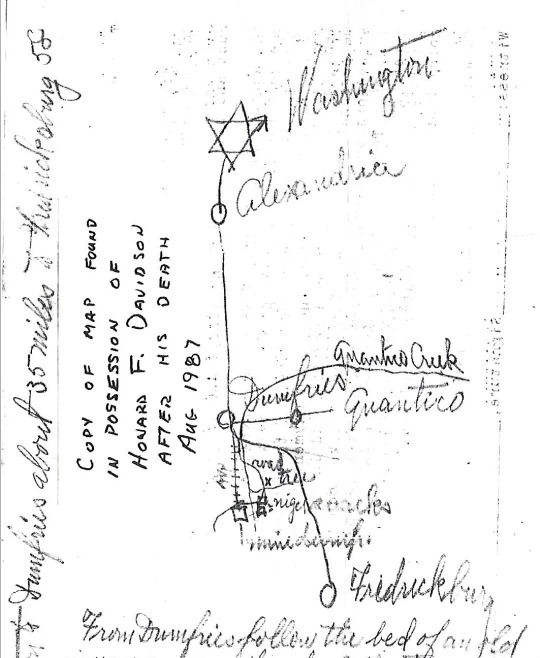
During WWI, Allan Davidson’s father, H.F. Davidson, served as in the U.S. Marine Corps, spending a few months at Quantico before deployment to France. He used the opportunity at Quantico to look for a tree that J.R. Hoy (Allan Davidson’s great-grandfather) and J. Murray carved their names into during the Civil War. Once located, H.F. Davidson drew a map and carved his own initials into it, relating the story to his family and saving this precious map. Let’s join Allan Davidson in 1997 as he headed to Dumfries police station meeting with then Lt. Charles Reid.
“He wanted to go with me on the search but couldn’t get away. He sent me to see Joe Calpin who has a “tourist trap” – Old Mine Ranch, an Old Mine Road; Petting Zoo for the kids and horseback trail rides.” In fact, one of his trails follows the old railroad bed. He, too, showed great interest and took me by foot – not horseback – to the old road bed. We followed this for about half a mile to the old mine dump, and crossed Quantico Creek on stepping stones without getting our feet wet…
We headed back downstream. The old road and two shacks my father referred to are no longer in existence. In a hundred yards we came to a spring run into Quantico Creek. I couldn’t decide whether this was the second creek referred to or not. In crossing this “creek” all we could find was a stand of old pine trees and almost impossible briar bushes. Not a beech tree in sight.
I was about to give up, conceding to time and nature, but Joe encouraged me on, telling me that we were then on Prince William Forest National Park land; and to go talk to the Park Rangers. This I did, Jacque LaVelle, a park ranger, found an old topographical made early in this century, which showed the old dirt road and two shacks; and more importantly, the South Fork of Quantico Creek about four hundred yards downstream from the bramble bushes I had been in earlier. The park rangers graciously took me in a four-wheel-drive vehicle down a private park road to near the confluence of the South Fork and Quantico Creek. At a point about seventy-five yards upstream on the South Fork where there was a faint semblance of an old road, we forded the South Fork – again on stepping stones. And there was “the tree” in front of us; right where my father’s map said it was! Nothing succeeds like success! My ingenuity never ceases to amaze me.
Time has made the carvings all but illegible. You can pick out a letter here and there by stretching the imagination to see what you want to see. After all the carvings are 135 years and eighty years old. But I am confident that we found the right tree. At least I will always think we did.”
The family researched the movements of J.R. Hoy knowing that he enlisted in the 144th Regiment NY Volunteers Infantry relying on James Harvey McKee’s Civil War Record book and research. They could place Hoy near Dumfries. They also tracked the movements of three other family members serving in the Union Army: George Davidson (72nd Regiment of the NY Volunteers), John Davidson (89th Regiment of NY Volunteers), and Thomas Davidson (144th Regiment of the NY Volunteers). The Davidson family have faithfully served the country throughout their history. While George survived the war, John died from injuries suffered during the Siege of Suffolk (04/11/1863 – 05/04/1863) and Thomas died at the battle of Honey Hill, S.C. (11/30/1864). H. Fletcher Davidson served in WWI in the Verdun sector receiving the Good Conduct Medal, Silver Star, and the French Croix de Guerre. (Side-note: Cher Ami, a carrier pigeon, also received the French Croix de Guerre after delivering numerous crucial messages, despite significant wounds from gunfire). Allan Davidson served in the Air Force during WWII and the Korean War.
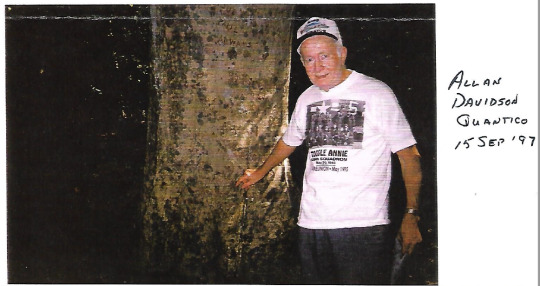
So, did Davidson add his name to the tree? “My response “Not very likely with two park rangers standing behind me. They take a dim view of people carving up their trees!”
Note: Starting your holiday shopping early? Consider purchasing an HDVI membership for your family and/or friends! Memberships come with free use of our Lee Lansing Research Library and alerts to our programs, such as our free virtual November Member Cookie Swap (prospective members welcome)!
(Sources: HDVI Archival Files: The Tree by Allan L. Davidson; Smithsonian National Museum of American History: Cher Ami)
#family history#local history#parks#research#genealogy#treasuremap#civil war#world war 1#familymemories#folklore
3 notes
·
View notes
Note
How does Alexander's personality change through the series? I've found that depictions of his later life range from showing as a splendid hero to a crazed despot. I'm excited to see your take, and to see how Hephaistion changes as well, and whether those changes bring him and Alexander together or push them apart.
HOW DO I INTEND TO DEPICT ALEXANDER IN DANCING WITH THE LION GOING FORWARD?
Ummm… this might have got long? My apologies. :-) I threw in some pretty pictures to cut it up?
I tend to see Alexander as a man made by his culture. Macedonian kings were expected to win wars and provide loot. Furthermore, his society named men heroes for prowess in battle and personal bravery, not selfless public service. It was deeply agonistic, with zero-sum competition and a constant need to prove one’s personal excellence (aretē). Such demonstrations brought kleos–fame–and elevated one’s personal timē–honor or public standing. Humility was NOT a virtue, and there were no poor men, only rich men in the making. ;)
Put all that together, inject it with a hefty dose of testosterone, and you begin to understand Alexander (and larger Macedonian society).
Modern attempts to paint Alexander (ATG) as a hero or a villain often depend on modern views of virtue, not ancient ones. We want our heroes to be Captain America, or Frodo Baggins. Good-hearted, honest, humble, sometimes reluctant heroes. They’re driven by a sense of SERVICE, not a desire for KLEOS.
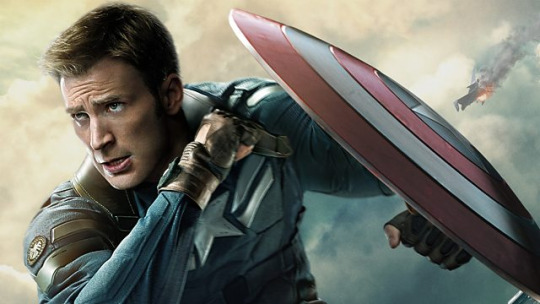
THAT IS EMPHATICALLY AT ODDS WITH ALEXANDER’S PRECHRISTIAN WORLD.
Which makes him a hard sell.
I don’t plan to paint ATG as either hero or villain, in the usual sense. The very last line of Dancing with the Lion: Rise is highly ironic. I won’t repeat it here for those who may not yet have read the second book, but while Alexander absolutely means what he thinks in that moment, it’s a young man’s fancy.
It ain’t gonna be so easy.
Riptide has said they likely won’t publish further in the series, even before the first two came out, because the whole thing is a tragedy, not a romance. The first two books (or really one novel) have a “happily for now” ending, so they were okay with that. But we all know how the story ends.
It’s not a tragedy, however, because Alexander is a megalomaniacal villain. The protagonists of tragedies are called the “tragic hero,” after all.
I want to continue writing him much as I tried to in Becoming and Rise: a human being with flaws and virtues. And as with any tragic hero, the greatest flaws are often overdrawn virtues. Virtue turned inside out.
So again, if you’ve read book two, go back to the novel’s last line. There’s his tragic flaw in all it’s glory. His desire to uphold that, often in the face of serious reality checks, will finally break him in Baktria, where in the name of virtue, honor, and piety, he’ll commit a terrible atrocity that will drive Hephaistion from him for some time. Hephaistion is still loyal to him as king, mind, but he can’t stomach what happens on a personal level. It’s no silly love triangle, situational misunderstanding, or manufactured angst for “drama.” It’s a deep, fundamental ideological clash–the sort of thing that Real Couples face sometimes, and must then choose to accept and move beyond, or acknowledge is irreparable and separate.
Obviously, they’ll get over it. But it’s not immediate. Nor easily. And it will involve a lot emotional blood on the floor, from both of them.
Baktria is the pivot point in the series, where it moves from triumph to tragedy. Things that came together are now falling apart.
Less poetically, Alexander is discovering–post Gaugamela–that “compromise” is the ugly truth of successful politics. I love the line from Hamilton, George Washington to another brilliant, impetuous young man named Alexander: “Dying is easy, living is harder.” Alexandros may want to be Achilles, but Achilles DIED.
In Alexander’s case, “Conquest is easy, ruling is harder.”

Alexander has no plans to die, but he’s going to realize how much of what he thought would be the case about rule…isn’t. And maybe his father DID know a thing or three, after all.
Historically, at the end of his life, Alexander is much less idealistic: shrewder, harder, less trusting, and more pragmatic. Just look at his appointments at the beginning and in his last two years. Early on, he’s inclined to put the former ruler back in charge, as long as that ruler surrendered to him, and add a garrison. After returning from India, he discovers how many of those men (and some garrison commanders too) betrayed his trust. So he kills the lot and reappoints…virtually all Macedonians (and a few Greeks).
This is the opposite of Tarn’s “Brotherhood of Mankind” (which was enshrined in Renault’s The Persian Boy, and picked up as well by Stone’s 2004 flick).
This is Macedonian Realpolitik.
It’s also Alexander Disillusioned.
But he’s still not the devil. That’s too simplistic, and too modern. While I greatly admire Brian Bosworth’s scholarship (he was THE Arrian specialist), I disagree with his assessment of Alexander’s career in his 1986 JHS article, “Alexander the Great and the Decline of Macedon,” wherein he ends with, “That was the unity of Alexander–the whole of mankind, Greeks and Macedonians, Medes and Persians, Bactrians and Indians, linked together in a never ending dance of death” (12).
What Bosworth ignores is that nobody at the time would have seen conquest in itself as evil, merely how one went about it. And how Alexander went about it is, actually, a mixed bag. Maybe that’s his problem. He’s not ruthless enough to be admired for his sheer bloody-mindedness (aka, Genghis Kahn), but he did some terrible things, which kinda undercuts the “squeaky good guy” image he wanted to project–and I think genuinely wanted to believe himself to be.
We live in a post-WWI and post-WWII world, where starting a war to take land is sorta frowned upon. Even if Putin, Xi, and Erdoğan Didn’t Get That Memo. But that colors how we read Alexander’s career. We can’t and shouldn’t ignore Alexander’s atrocities, but casting him as a Hitler-esque madman says more about us than him. Alexander was NOT Hitler.

One of the toughest things about doing ancient history is this weird “double think” wherein the historian must UNDERSTAND why ancient people do what they do or think what they think…without necessarily approving of it. THIS IS HARD. It’s really hard. Too often, both professional historians and fans of history either react with modern attitudes and anachronistic critique because they find something so appalling, OR they go so far into the “understand” that they confuse it with “approve.”
Walking that line is what I hope to do, going forward with Dancing with the Lion. There are ways to faithfully show ancient attitudes even while telegraphing to the reader that’s not okay. (Hephaistion often gets used for that, incidentally, both in what’s been published and in what’s coming.)
Back to Alexander…I suspect he was often frustrated with Macedonian pushback, given his need for approval/affection. (That’s one of the key elements of ATG’s character that I think Mary Renault hit dead on the head in her novels.) I also believe he was deeply disappointed in his Macedonian soldiers at times. As noted above, Tarn’s whole “Brotherhood” notion cracks apart when we look at what Alexander actually DID, not what he said in his “Reconciliation Banquet” speech. (Remember, ancient speeches are NOT what anybody actually said, but [maybe] the gist couched as a rhetorical exercise by the authors of these texts … regardless of whether it’s Thucydides’s “Funeral Oration” of Perikles, Arrian’s speech by Alexander after the Opis Mutiny, or Calgacus’s address to his troops found in Tacitus.)
Remember what I said about expectations for Macedonian kings? Win wars and provide loot. Alexander did that with bells on. As I’ve said before, here and elsewhere, he was the Energizer Bunny of Macedonian kings, just kept going and going and going….
Yet somewhere along the way, he decided he wanted to rule what he’d won, not simply plunder it. Opinions about Alexander’s “Persianizing” have waxed and waned. First, it was so tied into the “Brotherhood” concept that after Badian, et al., torpedoed Tarn, ATG was recast as simply a glorified marauder. Yet more recently, the pendulum has begun to swing back, pointing out that, rather than some ideological notion, perhaps it was pragmatic?

Alexander was a very smart man. He understood that to rule this new united kingdom he’d created, he had to get creative. I think he also, quite genuinely, LIKED some of Persian culture. IMO, there are two basic types of people. Those who see something different, regard it with fear and suspicion, and run away or denigrate it. Then there are those who see something different and regard it with curiosity and run towards it. Alexander was (I think clearly) the latter type.
Yet many of his soldiers were not. They belonged to the former type. Plus, they’d been conditioned to think of themselves as conquerors, masters, etc. They’d proven their superiority on the battlefield. It’s the most simple sort of ethnocentrism: the “schoolyard bully” type. We beat you, so we’re better than you. They didn’t hold with Alexander’s myth-infused notions of conquest. To be honest, I don’t think Alexander held with them after Baktria. But I do think he understood that if he wanted to become Shah-han-shah of Persia, he couldn’t squash the Persians (and everyone else) under his heel.
IMO, too many modern historians are inclined to elevate the objections of Alexander’s soldiers, as if they are somehow pure of motive while Alexander isn’t, and he’s betraying them. That’s buying into ancient narrative bias. Let’s recast the whole thing in the modern era.
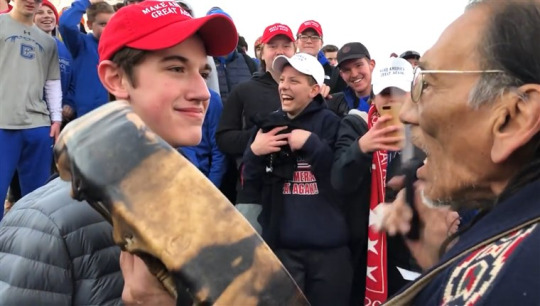
I see certain parallels between Alexander’s Macedonian soldiers and the red-hat wearing mobs at Trump rallies, terrified of the “browning of America” and convinced of their own cultural (and racial) superiority. The more diverse Alexander’s army became, the angrier his Macedonian troops got. One of the breaking points behind the Opis Mutiny was the emergence of the “Epigoni,” The mixed-race and Iranian boys trained in Macedonian arms. That INFURIATED the rank-and-file Macedonians. How dare Alexander share the sacred trust of Macedonian military might with Those People (who we just conquered and so, must be inferior to us)?
Reframed so, I think it easier to get beyond ancient pro-Hellenic source bias.
This is definitely something I’ll be playing with in the novel. It will NOT be “the poor, benighted troops are being mistreated by Ruthless Alexander.” But it also won’t be, “Alexander can do no wrong, and his men have no legitimate beefs.”
Life is NEVER that clear-cut.
NUANCE is all. And in the end, Alexander’s own virtues: his creativity, his ability to think outside the box, his insatiable desire to succeed, and his need to at least appear to be honorable…all these things will be his undoing.
(PSA: I reserve an author’s right to change my mind as I go forward and see how the series unfolds, but at least at present, this reflects my intentions, and some details aside, I think the gist will stay true.)
#Classics#Alexander the Great#Dancing with the Lion#DwtL#historical fiction#Tarn#Badian#Bosworth#ancient ethnocentrism#ancient Macedonia#ancient Greece#Hephaistion#Hephaestion#tagamemnon#asks#proto-racism
44 notes
·
View notes
Note
I read your take on a world war in black butler. I have read the older chalets and a small German reaper called sascha mentions a big war. And I know mustard gas was used in world war one. If not world war then any war? Surely they cannot forget about such a terrible thing exposed by a character that also exposed something may be weird in our ciels lineage. But why include mustard has if not a world war? Seems very particular doesn't it? Sorry for the long ask.
【Referenced post】
Dear Anon,
I am aware of Sascha’s mention of a potential war. It is indeed not for nothing that William and Grell went all the way to Germany to pick up the transfer documents. Likewise, it is probably not for nothing that Sascha mentions how if the balance of the world is overthrown, a war “so big it might hurl the entire world into it might happen”.
To give a slightly more accurate picture, I translated the two pages below myself.
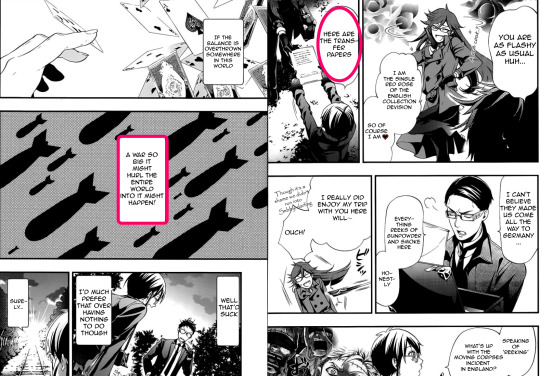
世界中を巻き込む大戦争が起っちゃうかも!
Sekaijuu wo makikomu daisensou ga okicchau kamo!
A war so great it might hurl the entire world into it might happen!
Of course, the keyword in Sascha’s words was ‘might’. Japanese speakers hate speaking with certainty-clauses when something doesn’t have solid proof. Even if the sky is covered by the blackest clouds, the weather forecast still says: “It is possible that it will rain” or “it appears that it might rain.”
Still, even if Japanese speakers love shoving responsibility away as much as possible, it still does not mean Yana ‘promised’ us a war IN her story. It could be that this is all simply a foreshadowing of a ‘future’ of the manga without the manga spending any time on any war it self.
IF the manga is going to feature ‘a’ world war though, it better not be ‘THE’ First World War. Like I said in the post I referred to above, the historical WWI happened in 1914. WWI is still too fresh in our human history, and the aftermath is still visible even today. It would be quite insensitive if Yana chose to include WWI in ‘Kuroshitsuji’ - a manga that despite the dark themes - still has a lot of wacky humour in it.
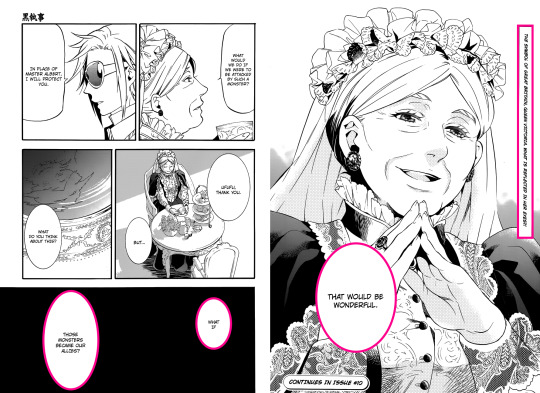
Presumably, if WWI or any world war will be involved, the Bizarre Dolls will be deployed. I Think that if done badly, it’ll be a boring rehash of the Campania Arc at best, and a cartoony trivialisation of the atrocities committed in WWI at worst.
As discussed in the post I referred to above, ‘Attack on Titan’ lost many readers because the WWI/WWII theme is simply too stale for many. Of course a world war is slightly more befitting to ‘Attack on Titan’ as the story’s main theme has always been warring dystopia, and the main demographics of the readers are slightly older.
‘Kuroshitsuji’ however… the demographics of the average reader is younger, and most fans simply did not become fan of this series because of this category of themes.
If ‘Below the Staircases VIII’ wherein Yana usually humorously discusses the feedback she gets from fans is anything to go by, Yana probably noticed how her manga is derailing from what it used to promise.
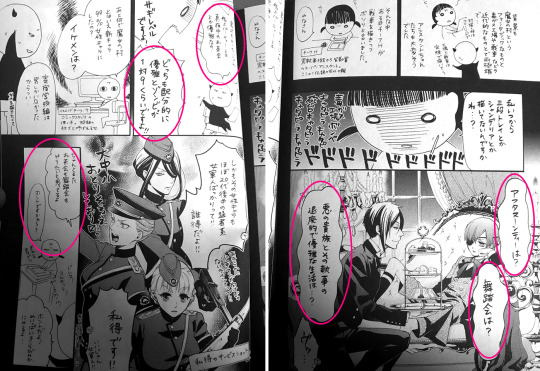
Assistant: When did I start not having any triple tier trays and chandeliers to draw? Now it’s toxic gasses, factories, gas cylinders, caterpillar tracks, tank caterpillar tracks, caterpillar caterpillar tracks! Where’s the afternoon tea? The balls? The decadent and elegant way of life of the Evil Nobleman and his butler…?
Yana: We just had something elegant, like the party on the luxury liner and the midnight tea party…
Assistant: And for both the proportions of elegance vs zombies is like 1 - 9!!
Yana: I really do want to do some tea parties and balls again though
Assistant: Oh but do you really?
Yana: Of course we’re gonna make it all sparkly again. But I just wanted to do some butlers punching tanks PHYSICALLY first!
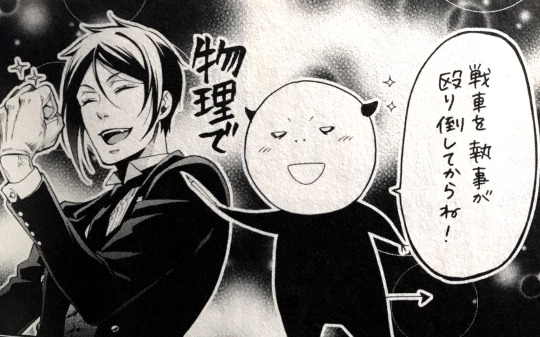
61 notes
·
View notes
Text
Day 4: St. Mere Eglise & Museums
This morning was a bit of a rough start for me. I could barely keep my eyes open! Fortunately, today was going to be an easy day, physically. I went back to bed after breakfast for 40 mins while Ken went and picked up a few more groceries. I will warn you...this is a long one.
We drove in, just past Carentan, to the D Day Experience and Dead Man’s Corner Museum. The Dead Man’s Corner museum is an old house that was used by the Germans as a headquarters until it was taken by the Americans. We walked through and learned about the German side of things. This house lies on a crossroad and it is named as such because an American soldier hung from a Sherman tank for over 3 days in the centre of this intersection. It just wasn’t safe for other soldiers to attempt to bring him down until after the area had been secured. We exited the museum into a shop, which is how all the museums end, except this one was different. The first section we walked into was full of real artifacts and relics from WWII. We walked around in shock that this was just readily available to whoever had the cash. I felt sick to my stomach as I gazed upon a nazi cap, selling for ~600 E. Why would they sell that? Who do they think is going to buy it? Why is it available to the general public? There were so many items including a paratrooper uniform on sale for 14 000 E. For a moment, I saw the appeal as a British canvas medic bag caught my eye. I picked it up, and another, and another. 85 E. Totally worth it I thought. Then it’s like reason smacked me in the head as I noted small red stains on the bag. No. Angry at myself and my disregard for the history item I held, I gently laid the bag back in the pile and said, “Let’s get out of here”.
Is this what we have come to...making a profit off of the belongings of the deceased who laid his life down for us? My heart breaks. I haven’t cried yet here, which surprised me, but this brought tears to my eyes. Sick, twisted humans consumed by the almighty dollar.
This was the first part of this museum and I think left a bad taste in our mouths tainting the rest of the visit. We did a flight simulator thing which was sort of lame. Then we went through the rest of the museum. I was still happy we went, as I got to see Winter’s uniform in person.
We made our way back to the car, passing a burger and chip truck stand...I looked with bright eyes at Ken, he said “we have sandwiches in the car”. So logic and reason set in, and we ate our sandwiches in the car while it rained. We sat there quietly, every so often asking each other, “ready for some more biking?”. It was hard. There was the option of driving to the next spot.....but, that’s not what we spent all that money on those fancy bikes for. It was only a 10 km ride into Ste Mere Eglise.
Ste. Mare Eglise. A town almost untouched by bombing. The church is here the famous landing site of Private John Steele who was hooked just beside the steeple. He survived the war actually- he was taken by Germans as a prisoner but escaped a few days later. There was a second soldier who got stuck on the lower part of the church in front of the doors. As soon as he was hooked a German aimed to shoot, but was quickly gunned down by another American soldier. Unfortunately, he took a bullet too and died of his wounds, laying down his life for the paratrooper.
This town is full of little cafes and shops. We grabbed a cafe avec lait and then quickly spotted a bakery. Oh. My. Goodness. The best pastry I’ve ever had in my life.
We made our way to the Airborne Museum which was incredible! They give you a little Ipad and as you walk through the museum you can click on different areas and learn about each spot. Very cool. It’s called a ‘histopad”.
We headed home and downed a baguette (yes a whole baguette between the two of us...every night..) along with a glass of bordeaux (or two) and took the advice of our host, Eric and visited the local church. We stopped along the way to meet their horses as well.
Perhaps the most moving moment of our time here so far was the conversation Ken had with Eric this morning when he recommended we visit the church. Eric is 70 yrs old, and he lives on this farm with his wife, Regine. He grew up here. Born in 1949. No stranger to the struggles of post war, he shared a different perspective. He spoke of being grateful for the liberation, but shared a slightly different viewpoint. He told Ken of how many civilians were needlessly killed, albeit unintentionally, by the allied bombings and being caught in the crossfire. A perspective that, perhaps the events were a bit disorganized and a bit sloppy, dropping bombs and blowing things up without regard for the civilians. As we walked to the church (built in the 15th century), I began to react defensively as Ken told me of the conversation they had. I countered by saying the Allies were under pressure, they didn’t know they were going to win. What if they hadn’t done those bombings, what if they were more cautious? We might not be here today. Slowly my arguments dwindled as I realized I had no right in hell to be arguing the points of someone who had lived through the post-war era. In all these museums, in all the history books and movies, and TV shows...the allies are the heroes. I hadn’t thought of this side of things. We arrived at the church, the sun was low but bright. The church was desolate. It looked as though no one had been there in years. We carefully walked through the graveyard and I came upon one grave, “1930-1944, 14 yrs old Daniel Marquand”. We wondered if perhaps this child died in the cross fire. As we walked past the church we saw a monument that read, “The children that died for our country”. It was dated 1914-1918, clearly the 1st WWI, but it had been added to, and there it was, “Daniel Le Marquand, Civilian Victim, June 8, 1944″. My heart sunk to the bottom of my stomach. Only moments ago I was trying to argue that freedom comes at a price, and thus I ate my words and walked home in silence.
Perhaps beyond the museums, the hype, and the souvenirs we’ve lost perspective of the dark tragedy and the human lives that were lost here: The Allies, the Germans, and the innocent civilians.
1 note
·
View note
Text
All-Stars -Story Mode- [CHAPTER 9]
A bit too soon as well with 50th Day of Countdown to April 13 just in case that something needs to have on the computer that is still had internet online just for temporarily til the internet on my computer is back to normal. Also another one is also based off what happened to me last year but kindness might have decided to cut me a break this time.
So, as the old saying goes: “Expect the Unexpecting”
Enjoy.
P.S Hint of what going to be in this chapter: “BWAAH” and “Tattletail love you, hehehe!”
-Chapter 9-
*You two had been wandering through the caves for what seemed like a while now. *Even that you didn’t know that this cave is connected to police station, who knew!
Mugman looked around in the darkness with the tip of his finger to illuminate the way in the caverns, with Frisk behind him, they had to stay together as they are gone ever deeper into dark caves after they escaped.
‘’This reminds me that day when me and Cups had gone into the cave that lead to a casino.’’ he muttered under his breath then turns over to Frisk as he asked ‘’Does this remind of-?’’
*You quickly told him yes when you remembered the first you went to the Underground. *But best not to mention that’s also where you met _ _ _ _ _ there for the first time too.
‘’Oh, heheh… I forgot.’’ Mugman apologized as he rubbed his head as he steadied the light on his fingertip, Frisk giggled for a moment then patting on his shoulder. Making Mugman feel better as he looked at Frisk.
*You told Mugman that it’s alright that he forgot, *Even though in a time like this and so on. *but for now, you need to find a way out of the caves and find their friends.
Mugman nodded in agreement with a gentle smile then heard strange noises coming from the cave beside them just one minute away as they both looked at it. They both walked towards it as they get a bit more clearer noise but it sounded like someone that is talking funny.
‘’BwahbwahbwahbwahwawawawaBwahBwah!’’ ‘’Hehehehe!’’
They go closer and closer to the cave and enters it, they noticed the signs like ‘’BWAH BWAH’’ and ‘’Beware Mama Tattletail’’ as they get closer to the night the light at the other end of the cave then finds themselves in a strange underground town filled with odd rabbit-like creatures and egg-shaped armless toys are walking around, making much mischief as they can together.
Frisk and Mugman looked at the sign on top of the cave saying; ‘’Welcome to Rabbid-Tail Town, enjoy your stay but still; Beware of Mama!’’ and obviously, it was poorly written, written like a 7 year old child had written it for them.
‘’Frisk, we should leave.’’ Mugman suggested to them, Frisk looked at him then at the store had a sign that read ‘’Tattletail’s and Rabbid’s Store’’ that is also like the welcome sign.
*You said to Mugman that they should get some supplies for *The journey ahead if they had found Cuphead.
Mugman looked at the store then looked at Frisk again and said ‘’Well alright, let’s see what’s useful in there.’’
They walked in the store and see a Rabbid zipped by and then jumped onto a box with a Tattletail on its head as it spoke ‘’bwahbwahbwahbwahbwahbwabwabwa!’’
Frisk and Mugman looked at the Rabbid confused because they didn’t understood what it said as Tattletail looked at them before giggling ‘’Rabbid is saying if you two want anything from here.’’
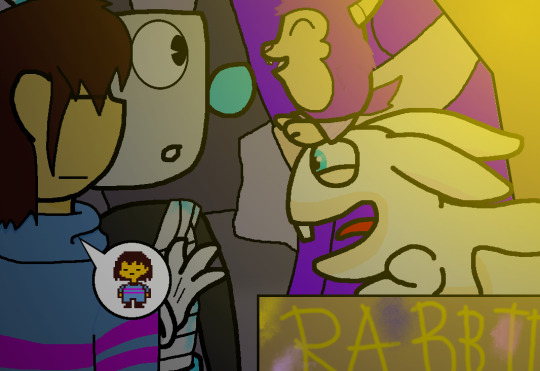
(Rabbid and Tattletail meeting Frisk and Mugman)
‘’Oh right. D-do you two had anything that might be useful?’’ Mugman asked at least one of them who can speak english, Tattletail hopped from the Rabbid’s head then pulled the red certains back to reveal a cabinet filled with simple things like canned food, a banana, weapons from both Medieval Ages to WWI & II eras and one WWII Marine bandolier that is strangely glowing reddish-yellow just barely visible to the two lanterns.
Rabbid now stands behind the box as it spoke ‘’Bwahbwahbwah?’’ and then the TattileTail explained ‘’He said ‘’What will you like?’’.’’
Canned Bacon Soups (Heals 20 HP)
An Banana (Heals 13 HP)
Sword (Damage 15)
Crossbow (Damage 12)
WWI Trench Knife (Damage 17)
Colt "New Service" Revolver (Damage 12, if at the heart, it’ll be 20)
WWII Marine Bandolier (DF 24)
Mugman looked around for a moment with Frisk while they are looking at the WWII Marine bandolier with curiosity, why is it glowing like that?
Mugman had finally decided as he said ‘’I will take three cans of Bacon Soup and a trench knife for my friend.’’ to them as Frisk looked over to Mugman with surprise. Rabbid nodded then grabbed three cans and the WWI trench knife that had been stealthed then putting them in a rucksack then giving it to Mugs as Frisk paid with the remaining golden coins.
‘’We even had another rucksack for free!’’ Tattletail stated the fact, Frisk looked at the bandolier with still curious thoughts.
Mugman then asked ‘’What are you looking at Frisk?’’ after he noticed them are looking at something.
*You said that you are looking at a bandolier they had in the cablet. *Then you asked what it is doing here.
‘’Bwah?’’
‘’The old thing? We had found it when we first came here.’’ Tattletail translated for his friend, looking at the bandolier as well then looked at Frisk.
‘’BwahbwahbwahbwahbwahBwaah!’’
‘’He said ‘’since you’re interested in it, we will let you have it!’’ How lucky!’’ Tattletail translated once again.
‘’W-we will? B-but-’’
‘’BwahBwah!’’
‘’”We insist!” he said, once again translated the statement for his friend as he grabbed the bandolier and a rucksack for Frisk as Mugman was amazed for their generosity and kindness.
‘’Well thank you! Thank you very much!’’ Mugman gleely gushed as they both walked out of the store and back into the town
Frisk looked over to Mugman with the bandolier in hand as Mugman looked over to them, he tilted his head a little bit for what Frisk is thinking then they hand over to Mugman.
*You asked Mugman if he could try it on.
‘’I-I thought you were going to wear it Frisk.’’ Mugman murmured as he scratched his head, Frisk took a step closer to him.
*You insisted if he should try it first, you said that you thought he might feel like a soldier if he put it on.
‘’Well…’’ he sighed in defeat, ‘’Alright.’’
Frisk handed the bandolier to Mugman then stands back for him to try it on, he puts it on and it goes across his chest, it’s too big for his size but it hands on his right shoulder.
*Mugman put on bandolier as it didn’t felt him well but it hangs onto his right shoulder. *For a reason, he feels tough, tough as his brother, tough as the bosses he had fought. *Fear that resided in him had faded away, he felt like he could laugh danger in its face. *He even can’t remember what fear was, only urge to shout ‘’Oorah!’’ *He had no idea what it means but; it sounded cool.
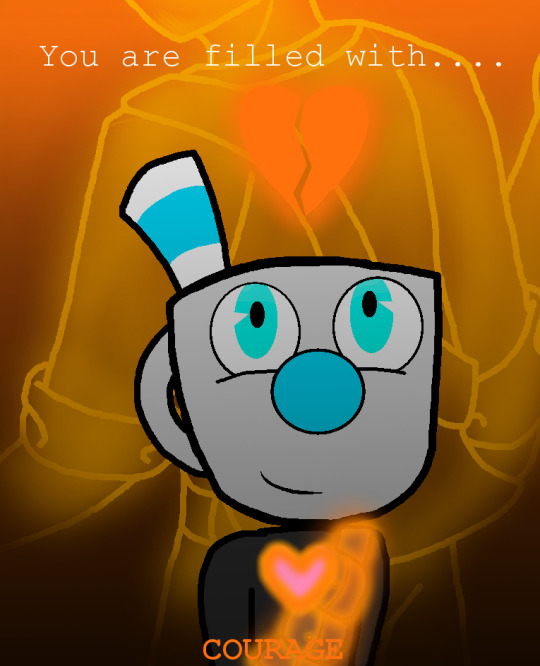
*He is now filled with… COURAGE
*You asked Mugman what does he think of the bandolier he’s wearing.
‘’It’d feels great!’’ Mugman exclaimed, revealing that he had sky-blue eyes as a bandolier is glowing a bit more now as Frisk giggled. Mugman blushed as he scratched the back of his head once more.
‘’Hehe. Frisk, you are too sweet for your own good you know?’’ Mugman said, Frisk nodded as they helped putting the rucksack on Mugman and in return, he helped Frisk with theirs on their back. He looked at Frisk and ask ‘’Ready to go?’’
*You said yes and let Mugman lead the way out of Rabbid-Tail Town.
They continued their journey through the caves, the water is dripping down from the ceiling above them, echoing the calming sounds as they landed on the glowing water flowing below as they walked beside it.
Mugman looked around as he hold hands with Frisk, his eyes had spotted something on a rock as he stopped to a halt with Frisk who then looked to what he is looking at: a lantern. ‘’It’s a lantern!’’ he said as he had fast walked towards it then examined it, ‘’It still got some oil left in it, I think it will help shine our way out of here!’’ he tapped on the glass a little as he smells the smell of oil inside it. Frisk walked over to him before they tapped on his shoulder, getting his attention.
*You said that none of them had a match on one of them. *One thing you is: How are they going to get it to lit?
‘’Well, I had the magic power on the tip of my fingers.’’ Mugs shyly said with a pun, Frisk giggled as Mugman did the finger gun again, seeing the familiar small ball of magic on his fingertips while he opened the lantern before putting his finger in, thus creating a small fire like lighting a candle. He then closes it then picks it up. Shining the area around them as he smiled.
*Lantern is lit a small flame thanks to Mugman. *I guess it helps to lighten up the mood a little. *Hehe.
‘’Now we can see better! Come on!’’ Mugman said, he felt confident now like Cuphead. Frisk nodded then headed to the direction Mugman had chosen, they walked fast through the echoing caves without fear then they noticed a kid just about Mugman’s age down the wet path.
It a 9-year-old girl with a with #3 pool ball for a head, she wore a orange-and-yellow-striped dress and boots that seemed to big for her since it had reached to her knees. She was looking around when she noticed them heading her way.
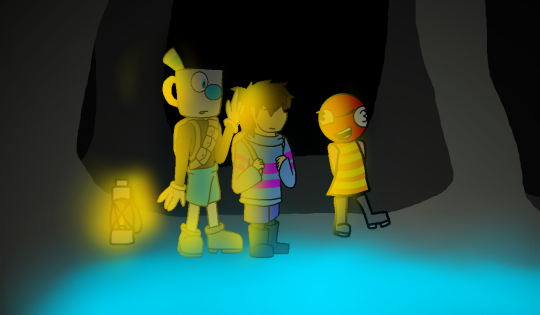
Meeting Trace
‘’Hi!’’ the girl said as they approached her while Mugman puts down the lantern, ‘’Hello? What are you doing in the cave?’’ Mugman asked as they stopped near the glowing water. ‘’I dunno, I had woke up here after a blackout in Inkwell.’’
‘’You were brought here from Inkwell Isle too? Oh my… Are you alright?’’ Mugman asked concerned for her safety, she nodded and said ‘’I am alright, I know those yucky undead things can’t get me and my family in these caves. Anyway, you must be Cuphead’s brother; Mugman, right?’’
‘’Yeah. I guess we are famous after beating the Devil after all.’’ Mugman answered, the pool ball head girl looked over to Frisk and said ‘’Is this human a friend of yours?’’
‘’’Yeah, to me, my bro and our friends. What is your name?’’ he questioned to the girl, she gushed ‘’Well, my name is Trace! I am a number 3 pool ball and unrelated to Mangosteen.’’ as she twirled her leg around and giving him a wink.
Frisk tapped on her shoulder, making Trace to look at them.
*You asked Trace if she had know a way out of The Caves.
‘’Yeah! My dad had lead me to where it was yesterday, so it wouldn’t be that hard to go through these caverns.’’ Trace said as she pointed out a way as Mugman picks up the lantern while he said ‘’You do?’’ with hope.
‘’Yeah, follow me!’’ She said as she walked forward with them following her into the tunnel of The Caves, along the way, she sang
‘’Through the darkern caves~ where the water flows while it glows it’s cyan-blue light to lead the three friends a way and out the caverns of the night~’’
As her voice had echoed through the walls of The Caves while they enjoyed her singing throughout the journey then they stopped along with Trace as they noticed music had began playing throughout the caves then voices claimed into the music by singing:
The light through the window streams in and
Breaks on your brow
(Breaks on through to you)
And she floats on by
‘’Oh!’’ she had whispered to Mugman and Frisk, ‘’This song had begun playing again! This had happened over two days ago, on my first day in The Caves, this song had played while we’re trying to settle in, my older brother and dad had gone out to see who was singing but no one’s there but on the second, the song had extended with more lyrics to it. Be quiet and pay attention.’’ She hushed to them then hushering them to continue on walking as the woman’s voice had began singing with the music.
Beautiful sad, lost child
Cruelty reconciled
I stand with you, forever
Can you feel me here?
They walked as they noticed the ribbles in the glowing water had started to go along with the music like someone had been throwing pebbles of rocks into it as the woman and voices sing the next verse together in perfect harmony.
Remember
(Her love will find you)
(Her love will reach you)
(Held in her arms, remember)
They then look up and saw tiny blue lights are flying around them and then away from them, they all looked around as the voices had continued to sing their souls out.
Forever
(Her love will find you)
(Her love will heal you)
(Shield you from harm, forever)
Forever
They then noticed a shadow of a woman coming from the next tunnel due to a light-blue light, the figure was dancing gracefully like a ballerina, they tiptoed to the tunnel as they kept the eye on the shadow as the woman sung once more.
I’ll shield you
Remember
Then the figure stopped dancing as if whoever she is seemed to know they are there before the three kids ran into whoever is singing and dancing.
Heal you, forever
As quickly as she sung the last verse of the lullaby, she disappeared in a quick flash and smoke as fast as lightning before they get a chance to look at her.
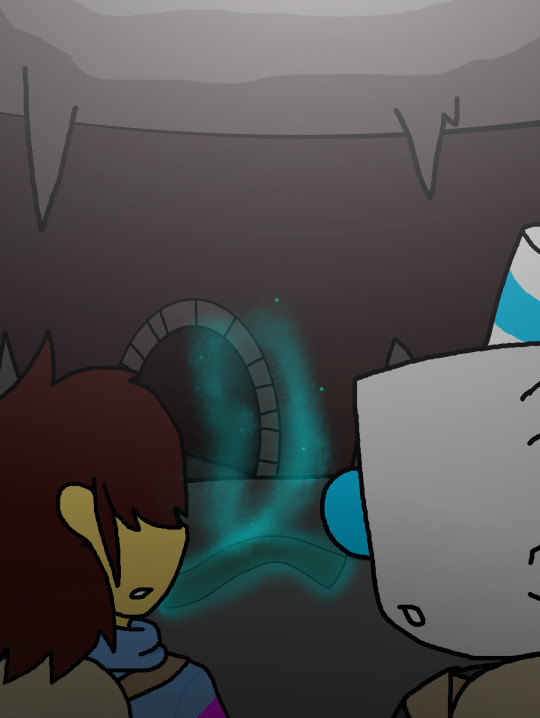
She’s… gone? But how? As the music is approaching to it’s fated end, they looked around for the woman but they didn’t find her… yet they did find one thing on the floor; a dark green scarf just laying down on the floor.
Frisk walked over to it and picks it up.
*You had picked scarf. *...Yet, it smells of vodka for a strange reason.
Frisk then puts it on their rucksack as Mugman looked around the area as he spoke ‘’She was singing and dancing in here but she had vanished!’’ then looked over to Frisk and Trace with concerned. ‘’Do you think that this cave is haunted?’’
‘’I am not sure yet Mugs but it would be awesome if it is by some ghost lady.’’ Trace replied to Mugman who is now looking at the other tunnel as Trace looked at it with Frisk as she said ‘’It should lead us out of here!’’
‘’Right, we better get going before-’’ Mugman said as the same woman’s voice that had sing suddenly said ‘’Behind you…’’
They all turned around and sees a man they had dreaded and hoped they will never see him again; Colonel Mael Radec. Who is holding a gun and one of those jetbacks on his back, he took a step closer to them with anger and cold toned his voice ‘’You thought you could escape us? Your friend’s kind knows no hope in that.’’
‘’Y-you mean making a deal with the Devil?’’ Mugman asked confused but right now at this moment, he felt brave, brave enough to punch him to the ground for kidnapping and taken him and his friend hostage in a cell.
‘’No, ISA… Now surrender now and return with me back to camp.’’ Radec had demanded to them, gripping his rifle tight than before as he sensed something is up with Mugman who felt anger for first time.
‘’Or you will what?’’ Trace asked in a fright, hiding behind Frisk as if her life and existence depends on them. Radec then aims the weapon at them in one hand and said ‘’Don’t. Toy with me creature. I will not ask you two again; Surrender now and return with me back to camp…’’
*....... *You looked over to Mugman and…
*He refused.
‘’NEVER Freakbag! Never in your life!’’ Mugs barked at him before covering his mouth, what is wrong with him? He had never said that to anyone before other than Cuphead! Something in him is taking over like a remote-controlled toy.
That made Radec aim his rifle at Mugman with his voice more colder than ever, ‘’You should’ve give up on escaping when you had the chance. If you’re going to come with me or do you know how defend yourself?’’ he had said before cocking his olympic shotgun back and ready to use it if necessary.
‘’I… I uh…’’ he said before looking at his hand before making the finger gun once again with magic on his pointer finger then looking at Radec. ‘’Good,’’ he announced ‘’Now there’s any plan you have left, I am afraid that it will not work well for you Mug.’’ then he gotten himself ready to fight Mugman who stood his ground as he had his arms out, shielding Frisk and Trace from him as he yelled to them ‘’Run!!’’
Frisk and Trace looked at each other before running away, leaving him in the room alone with Radec.
*Radec had caught up to you in time.
Mael Radec vs Mugman
A battle is sure is blowing, you’re up!
Radec opened fire first but Mguman had ran out of the way, then he fire back at him multiple times before he flew over him with the help of a StA-X6 Jetpack he had equipped, before landing and getting out an electric hand grenade and throwing at Mugman, it explodes and stock Mugman as he groaned in pain, stuned.
Radec didn’t hesitate and ran up to him, grabbing and throwing him at a wall, he loses one of his HP now at 2%
Mugman got up with his legs shaking, then looked over to the colonel with anger, he then rolls up his sleeves and readies the finger guns once more while Radec had thrown down the rifle and getting out a combat knife as he vanished into thin air.
Mugman looked around cautiously for any sign of movement till he sensed him from behind and opened fire immediately at him as he uncloaks. He yelled in pain before slashing out at him with the combat knife, he dodged it quickly as they quickly backed into the light coming from the ceiling, shedding more light to the fight as Mugman kept firing at him with no hesitation.
Get him in the hand where’s he’s holding that knife kid!
A familiar voice came to Mugman in his head, he looked around as he whispered ‘’What…?’’ as Colonel Radec had slashed again, Mugs barely misses it and got crack on the arm from the attack, making him hold it to prevent it from bleeding.
‘’Will you please leave us alone and let us go?!’’ Mugman yelled at the Helghan who studied his ground, ‘’I will not, unless it would help your allies with their situation if you had come with me to Helghast.’’
‘’I will never join you!!’’ Mugman spat out towards him as his voice had mixed with someone else’s as he hold his mouth again while Radec looked at him like he was possessed by a spirit.
‘’What had gotten into you…?’’ he questioned as he turned his attention towards a ghost of a… man. He then swears it was Dempsey but different, far more different than what he was or who he was either.
That man is Caucasian like Dempsey but his hair is a little blond and buzz-cut, is wearing WWII Marine uniform with sleeves rolled up and is wearing the same bandolier that Mugman is wearing.
Radec had never seen this happened before but he knew he had to act fast to get it off of him, he looked at Mugman as he slowly became invisible once again.
“W-where did he go??” he gasped as he looked around for any signs of him, Dempsey’s voice came to him again “Don’t worry, it’ll be fine kiddo. Just leave it-” but was interrupted by Radec grabbing Mugman by his head’s handle.
“AH! Let me go!” Mugman begged as he struggled to break free as Radec grabbed the bandolier before taking it off of him before dropping the mug on the ground, Mugman felt courage began to leave him and fear once more taken its place. “Sh- Don’t be scared! It will be okay kiddo…”
Mugman had heard the voice in his head fade away as his eyes slowly went back to normal, Radec then threw the bandolier to the opposite side of the room as Mugman helplessly watched. Radec looked down at the mug and said “Nothing with to fight me now.” as Mugman is looking at him.
“L-Listen! You really don’t have t-to do this! This is not your kind would race would want!” Mugman pleaded as he crawled backwards towards the wall as Radec took a few steps towards him. “You will stand and fight with us like soldiers or you’re against us.”
“Never! I-In this universe, you’re a pest! A rat!” He yelled as Radec had took a glare on him, he shook his head slowly and said “Then this is what you wanted, in otherwise…” then pulled out a pistol. Unaware that someone is in the background, picking up and putting the bandolier on then turned their attention towards the unexpecting two.
Mugman was shaking as Radec pointed that weapon at him, “What are you going to do now?” he said, Mugs was so scared that he had began to thought about his options: Scream for help or run away, fight or flight mode?
Mugman was choosing til he screamed “SOMEONE HELP ME!!” as Radec stood still, gun still trained on the fear-filled mugs.
*You called out for help….
…….
*But nobody came.
“Don’t,” Radec scowled, “You dare scream like that again. It’s weakness.” as he got ready to fire a bullet-
*But… All but Cuphead did!
“You stay away from him!” He screamed as he throws a blast attack on Radec, knocking him off of his feet and dropping the pistol in the process. Mugman’s eyes went wide as he sees his brother and he’s wearing the bandolier he had lost when that Helgen took it off and like before, his eyes are sky blue as well.
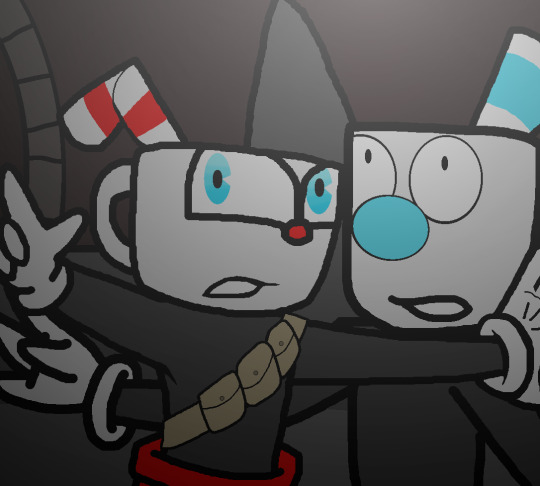
*Cuphead is now filled with… COURAGE
“C-Cuphead! Y-You’re okay!” Mugman gasped as he looked at his brother, Cuphead smiled as he too is glad that Mugman is alright then turned back to the Colonel with the finger gun ready, eager to fight him now. “You should be taught a lesson!” he bellowed out towards him as he got up and back on his feet.
“Clever of you, I admire that but that is suicide.” Radec as he got out a rifle, Cuphead hushered Mugms back a little as his brother looked at him while he said “Ready to fight Mugs?” Mugman nodded as he got back on his feet, he looked over to his brother and said “I thought I lost you Cups.”
“I thought I lost you too, I’m glad I came here just in time.” Cuphead smiled as he looked at him then they turned their attention towards Radec with the finger guns ready.
In a flash, they dashed towards him as Mael stood ready to fight them.
Ready? Now go!
Meanwhile… [Long before Frisk and Mugman escaped… A little bit before.]
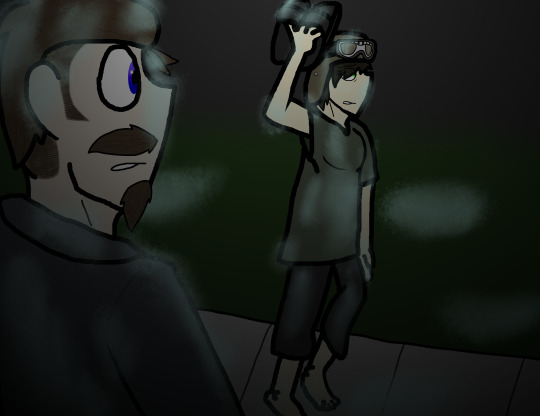
Your Rain (Made on 10/2/2018)
Nikolai had unknowingly found himself in a place at nighttime with clouds covering up the sky, he didn’t know this place this time, he remembered after Mugman, Frisk and Boris had been captured then they had to retreat thanks to the walking dead and hide in some place.
Then the next thing he know: Everything around him gone dark and then he found himself at an unfamiliar place but he can read the sign on it’s wall.
Windsor Elementary School
He wondered in disbelief, then when he looked at himself; he’s not in his usual attire, only a dress shirt, pants and boots. He rubbed his head and that is when he realized he is not wearing the aviator hat as well. It concerns him more; that made him completely vulnerable to any armed forces and not armed with a gun or a melee weapon.
Was this a dream? Or an illusion? “Hmm…”
He looked around for a little bit more, there lampposts lighting the streets, some of the houses are lights and vehicles he didn’t recognized. He is alone in that place, no doubt about that. He looked up at the flag post and sees the American flag, that confirmed he’s in USA but what state?
Nikolai was still concerned though, then he said his thought out loud “This can’t get more worse, can it?” but he realized he had said it too soon. Thunder roared from the sky, catching Nikolai in surprise, then the wind begins to blow hard and to top it off, it began to rain as well as lightning strikes once more.
Defeated, Nikolai looked down and muttered “Obviously, it can.” then he heard the sound of footsteps coming towards him, that made him realized that he’s not alone like he thought. He turned around and see a young lady, with a light brown aviator hat with goggles, army green t-shirt, blackish tie-up pants and black rubber flip flops, she came from around the corner of the school, almost of nowhere as if. She stopped for a moment to take her flip flops and then used them as a shield against the storm but it still got onto her nonetheless.
“Excuse me! Please miss, can you…” Nikolai spoke up but she, for an odd reason, didn’t seemed to hear him. That made Nikolai realized as he watched her go by, so helpless in the rain while she walked in bare feet. He then decided to walk with her, maybe if he could get to her then he will know what’s going on, seems like a plan, right?
He then walked fast to catch up with her, “Do you hear me? Mind telling-” Nikolai was too shock to finish his sentence when he tried to place his hand on her shoulder only for it to go through it like he was a ghost. He stopped in place after it had happened as thoughts raced through his mind. Has he died!? He grabbed his arm to see if it’s true but he is able to grab it and feel his blood pumping, he was a little relieved to know this but it doesn’t explained why his hand had gone through her. Maybe he really just dreaming of this.
Then he realized she had gone over to a small one story white house with a flag pole, she rang the doorbell as Nikolai walked up on the porch to be safe and dry from the storm. The porch light came on as they both stood, then a door opened and there was an elderly old woman is standing there in robe.
“Well hello there.” The old lady spoke with concern, “What are you doing out here in the rain?”
“I-I was swinging on the s-swings when I didn’t noticed the storm coming in, as much a-as you can see.” Young lady explained in between her voice stuttering, playing on the swings? Nikolai found that odd the she is an older than a child, she should about that by now right?
“I see, does your parents know you’re here dear?” the old lady questioned as an old man, her husband came from behind the wall to see who it was. “Of course they do, I-I come to the park from home often. It’s not far from here b-but it is a couple of blocks away from here.” Young lady answered with her voice had tone to a soft cry for help. Nikolai can hear it as the old woman nodded “Alright then, do you need a ride home?”
“O-Of course! Of course I do.” She accepted the offer, “Well alright then, can you come inside and wait so I can get you a towel to dry yourself off?” she kindly asked, with a nodding from the young lady while she stood aside and lets her into her house, Nikolai quickly ran inside before the door could close on him. He was surprised that no one didn’t notice him come in, almost as if he didn’t exist… like he was invisible.
The old lady heard her husband saying something to her, he needed to talk to her for a minute. The old woman turned to the young lady and said “Wait here for me, will you? It will only be for a minute.”
“Okay.”
Then they went to another room while she stood where she stand, Nikolai looked at her, all wet and alone as he wandered in his mind; what is going on? Was she the connection to all of this… is this a flashback of her memories?
That last question is too strange for Nikolai’s mental state of mind as he continued to watch her, she was like a lost, cold and confused child.
She looked around the house but she didn’t move, she was scared that she will get the furniture wet if she sat down one of them. Young lady looked around as she took off her aviator hat that revealed her short brown hair as she feels it through her fingers.
Then finally, she began to walk towards the hall where the old couple had entered with Nikolai following her as she scanned each room she went passed then she looked to the room that he assumed that it’s the couple’s bedroom. She looked into the room and see the couple talking then they noticed her in the hallway. The kind old woman walked out of the room and went into the room that the young lady was next to and comes out with a pinkish white towel for her to dry off. “Well, since it’s raining bady outside,” she began as she gently put her hand on her shoulder, “Would you like a ride home?”
Young lady looked at her with surprise of the old woman’s kindness and selfless, “Yes…!” she agreed without hesitation, old woman walked with the young lady and Nikolai followed behind her to the backward with roof over the patio, she accidentally knock over an empty pot.
“Oops! S-Sorry…” She awkwardly apologized to the old woman, she simply smiled and replied “It’s alright, it’d happens so don’t worry about it.” Nikolai followed them to a garage and see a car that again he didn’t recognize, the old woman walked over to the driver’s seat while the young lady walked to the passenger seat, they do exchange peasantry as the old woman opened the garage and gotten into the car and turned on the engine.
They then leaved the garage and back out in the rain, the young lady seemed to leading the old woman the way back to her home and Nikolai ran out to try to keep up with them but the car drove away. Leaving him alone in the rain as lightning strikes once more and the woman sung softly in the air as drops of water fell down from the clouds.
On the sidewalk of the city
Are my screams just a whisper?
Busy people going nowhere
See me soak in the rain
No compassion, nothing matters
My resistance is waning
Like a flower in the basement waiting for a lonely death
“Time to go back.” a voice called out behind him, making him turned around to see a woman, wearing a cloak and a blindfold, on her neck is a collar with a pendant that looked familiar to him due to its marking.
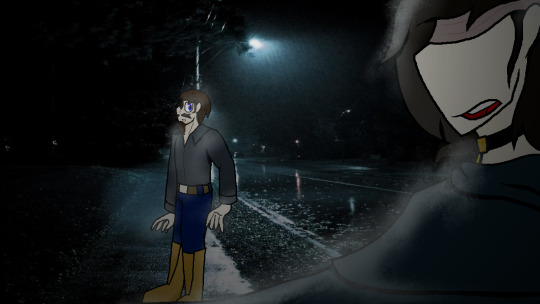
(Background used is from WallpaperUP)
“She has come back with a pack of hatred to sack us with. An neverending rack of sorrows and her rain…” She spoke in rhyme, Nikolai had no idea what she means by that when her hand glows in a white aura and then had unleashed it onto Nikolai as everything around him had gone white….
Please, save her…
#All-Stars Battle Royale#All-Stars -Story Mode-#Kill Zone#Cuphead: Don't Deal With The Devil#Call of Duty Zombies#Ultimis Tank Dempsey (Ghost version that Possessed the object once belonged to him)#Primis Nikolai Belinski#Mugman#Cuphead#Frisk#Rabbids#Tattletale#Colonel Mael Radec#Trace (OC)#Knight the Servent (OC)#OCs#???#Your Rain#Akira Yamaoko & Mary Elizabeth McGkynn#Remember Forever#Tori Letzler
4 notes
·
View notes
Text
Welcome to another WWW Wednesday! This meme is hosted by Taking on a World of Words. To participate, just answer the following three questions: What are you currently reading? What did you recently finish reading? What do you think you’ll read next?
I’m currently reading…
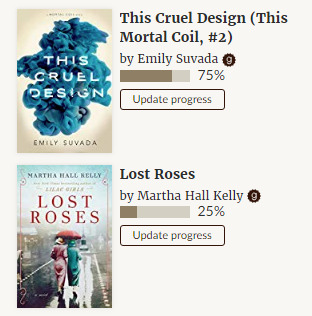
This Cruel Design by Emily Suvada
I’ve been listening to the audio book of the sequel to This Mortal Coil. The two books have similar average ratings on Goodreads, but for me personally, the second installment isn’t working as well as the first.
Lost Roses by Martha Hall Kelly
I don’t know why it took me so long to get through the first quarter of this book (other than the fact that I was reading other books at the same time) but I’m starting to feel invested in this story. This is a prequel to Kelly’s last novel, Lilac Girls, although it can be read as as standalone. Lilac Girls is a WWII historical fiction novel, and Lost Roses takes place during WWI and focuses on the women one generation prior to those of Lilac Girls.
I recently finished reading…
American Princess: A Novel of First Daughter Alice Roosevelt by Stephanie Marie Thornton Full review to come, but I feel like this is a must-read for historical fiction fans. The genre is so overloaded with WWII fiction (and don’t get me wrong, I read and enjoy those stories, but a change of pace is in order) and Alice Roosevelt, daughter of Theodore Roosevelt, is a breath of fresh air. Theodore Roosevelt once famously said “I can do one of two things. I can be President of the United States or I can control Alice Roosevelt. I cannot possibly do both.” American Princess will show you why.
Beautiful Bad by Annie Ward This one was honestly a disappointment for me. As always with thrillers, particularly domestic thrillers, take my opinion with a grain of salt, because I am finicky about the genre, but this felt overly predictable and didn’t seem to cover any new ground not covered by a hundred domestic thrillers before it. If you read a lot in this genre, this probably won’t be for you; if you pick it up only occasionally, your experience may be a lot better. Regardless, there are much better thrillers out there to read.
Daisy Jones & The Six by Taylor Jenkins Reid Daisy Jones needs no introduction; this was one of the most anticipated 2019 releases. This was a reread for me because I wanted to experience the book in audio book format now that it’s been released, as the way it was written seemed very well suited to that. I definitely preferred the audio format to print for this one, so if you haven’t checked it out yet, check your library for the audio book! Read my review here.
Up next…

A River in Darkness: One Man’s Escape from North Korea by Masaji Ishakawa
(This is March’s Girly Book Club pick!)
An Amazon Charts Most Read and Most Sold book.
The harrowing true story of one man’s life in—and subsequent escape from—North Korea, one of the world’s most brutal totalitarian regimes.
Half-Korean, half-Japanese, Masaji Ishikawa has spent his whole life feeling like a man without a country. This feeling only deepened when his family moved from Japan to North Korea when Ishikawa was just thirteen years old, and unwittingly became members of the lowest social caste. His father, himself a Korean national, was lured to the new Communist country by promises of abundant work, education for his children, and a higher station in society. But the reality of their new life was far from utopian.
In this memoir translated from the original Japanese, Ishikawa candidly recounts his tumultuous upbringing and the brutal thirty-six years he spent living under a crushing totalitarian regime, as well as the challenges he faced repatriating to Japan after barely escaping North Korea with his life. A River in Darkness is not only a shocking portrait of life inside the country but a testament to the dignity—and indomitable nature—of the human spirit.

Other places to follow me… Tumblr | Facebook | Instagram | GoodReads
What are you reading this week? Any thoughts on the books listed in this post? Please feel free to discuss or share WWW links in the comments!
WWW Wednesday 03/20/2019 Welcome to another WWW Wednesday! This meme is hosted by Taking on a World of Words…
2 notes
·
View notes
Text
A440. Not A435. Why?
I had a wonderful time looking through the original armistice and supporting document that showed that in 1919, the post-war European community and North America committed to 435 Hz for the standard Diapason Normal.
However, anyone who follows Western music knows that the current standard is 440 Hz. The next phase of this quest begins with the looking at some political impact of the Treaty of Versailles. Not only is what I am going to write, “arm-chair” history, it is also based a lot on my limited grade school training (may I say, ca 1970′s-biased) and based upon very small selected reading about the era of mid-late 19th and early 20th century geopolitics. And, as an amature affectionatto of comic art, a lot of what I see about U.S. posturing and waffelling during the early 20th century is based upon the wonderful political comics from the era. As my parents used to ask me when I was young, “How’d you know that?” And I’d point to the political cartoon from the paper that day.

Source Ohio State University - https://hti.osu.edu/opper/lesson-plans/wilsons-14-points/images/barring-his-way
Coincidentally, I heard a wonderful interview with an author that has just released a book on this subject in general. How to Hide an Empire by Daniel Immerwar is on my to-read list. The book has more to do with territorial United States. But the general imperialist drive was as strong as ever post-war. Like a nasty big brother trying to take most of the cake after the fight was over, the political posturing inside and outside the U.S. was mostly to take and make itself more globally important and culturally powerful.
In the 1930′s (pre WWII), there is little argument that the United States delivered a global political posture of Imperialism - if not outright colonialism that had extended from the Spanish-American war through the Roosevelt era. A lot has been written about Wilsonian policies. You wouldn’t think this would have anything to do with concert performance standards in Europe post-war, but in fact, one of the most amazing things I learned while perusing the Treaty of Versaille is this entire section 2. Section 2- Article 282, has all of the kitchen sink items that the countries deemed necessary to settle once and for all. I liken this to being the part where the negotiators say to the parties, “And sirs, is there anything else you guys want to settle here once and for all?” Like a kid saying, “Yeah, and I wanted that candy, too!” So a whole bunch of interesting stuff came out of that list. I will share some of that later.
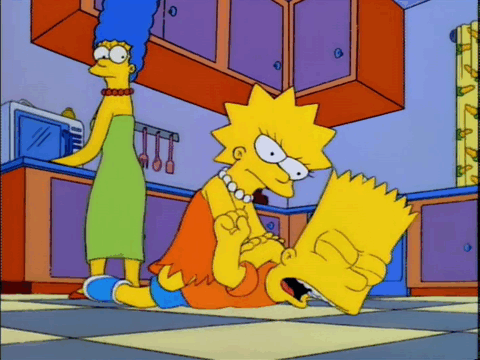
Deeper reading into the history of diapason normal debates going back to the 1855 treaty mentioned in the prior post taught me that this battle over both the creation of the “normal” and the value of the normal (435 versus 440, versus other frequencies) went way back prior to the 19th century especially in Europe (North America still being a western world social pariah in the 18th century.) So I can easily accept that this would be on the list of “wish we coulds” for the armistice of 1917. Now that I saw the context of the list of things included in that section, it became more obvious that it actually makes sense to have this in the treaty. I am a converted man on this subject now. I am not longer scratching my head about it being referenced here. “No more fighting, boys. We addressed all of your issues. Okay?” If you want to be shocked at how extreme this is, check out the actual list (see page 170)! Here it is:

So far, pretty mundane. Mostly agreed upon tolls and tariffs and an interesting standardization of railroads #4 (tracks and such if you look into it). I will note some things that put this into context and save the details for my next post on this subject. But #2 is REALLY cool. I will share more on this that later. Any reference to “motor-cars” piques my interest. Also note #1 which makes sense post-war. And we go on...
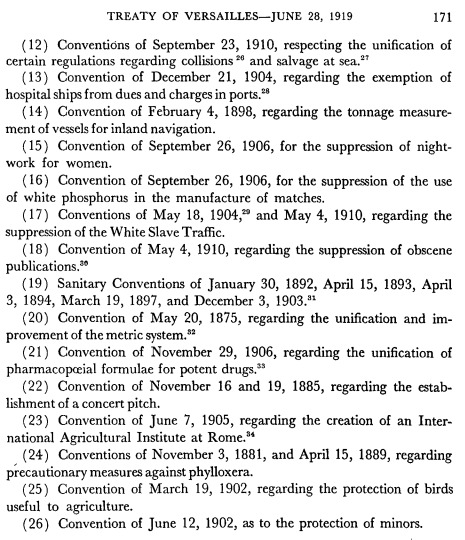
With 12-14 back to tolls and tariffs. Then come the SOCIAL ones. This is what is so interesting. Again, take this in context. The winning powers (big brothers) after the fight are now going to pick the things they get to enforce on the world (or at least for Europe for now). The war to end wars is supposed to stop the bickering and delivery all the rules on how to behave. This includes a new set of social norms. I keep saying this, and I will say it again. I will get back to a few of these specific items on why they seem so silly here, but were of huge geopolitical social importance in 1919. Amazingly, look at #15, 17-18, and 26 as progressive and at the same time regressive social rules. And then look at #16 (what is that about? Matches???) and 25, bird? and our favorite “Concert pitch”. It is like a kitchen sink of items. I assure you that when you look at these in detail, they each represent a longer term social issue that was unresolved. And, often, the issue was quite significant to the overall worldwide population.
But I digress. The diapason normal was 335 Hz in 1919. After this, there was a push to make a formal standard committee embrace this diapason normal under a different set of standards - literally. I found evidence that going into this battle in Europe, in the United States, there was a belief that “science” showed little difference between 435, 438 (the compromise proposed) and 440 (the German standard). Even in the United States, there is documentation that describes how some scientists wanted to leave well enough alone and leave it at 435.
However, between the wars, it seems that the United States and German did not participate in the 435 standard. The Acoustical Society of America decided that the standard should be 440. Why? I do not know. But by 1936, the Americans sided with the 440 and placed it into their standard. This does not make it diapason normal, though. So for what seems to be the time between 1936 (WWII) and 1955, the United States joined with Germany in continuing to use 440 as the tuning standard, while the treaty said it should be 435! I was surprised by this. Several documents point to this, but do not explain why The U.S. was so bull headed about this. If the research (and I dare say, common assumptions) would tell you that once established, nobody can tell the difference, then why did the U.S by themselves put it into their standards in 1936 (less than 20 years after Europe resolved the issue). I have no answer on this. I have a post facto answer/excuse that arrives after the next stage, but nothing as to why this was such a big deal to the U.S in 1936. There are conspiracy theories about this because of the German connection but those seem like they are contrived.
After WWII, the same push that drove the standardization post WWI happened again after WWII but as far as I can tell, there was no post-WWII declaration of standard pitch. However, there was a push again for the scientific community to come together on international standards. In 1947, the International Standards Organization was formed (ISO). Many people are familiar with ISO. It establishes, documents, and helps evolve standards for just about everything. I have had personal experiences with ISO over the years with data communication and quality standards. One example that everyone experiences daily is the ISO 9000 standard suite for quality.
The ISO came out of a drive in the post-war era to deliver a more generic solution to that problem described in the post WWI days. In other words, for those things that require universal standardization (like concert pitch?), we need an international organization to address this need. For example, if we want to standardize on household electrical power norms -- even if we cannot change our world-wide deployment (110 volts versus 220 volts for example), at least we need to document and define these differing standards so that the worldwide community can interoperate. I consider this to be more of a meta-level approach to solving the same issue that the Treaty of Versaille Section II, Article 282 tried to address. This is a guiding principle of the organization, and remains a lofty goal. In 1955 the 440 Hz standard was officially entered as ISO 16. I did not pull it because it costs money to see it but it is here: https://www.iso.org/standard/3601.html.
This still bugged me though, because why would they have taken the U.S. request for 440 over older established 435? And, does this mean that diapason normal is not the same as ISO 16? Well, frankly, I am not completely sure on the last point. I see no formal migration to the ISO standard although I do see a relinquishing of stature in some supporting texts from the era. It is fair to say that the world has conceded, but I still do not see where it did so with a revised diapason normal declaration. Here is a funny clip from The Acoustical Society of America as late as 1971 was lamenting that Europe still had not come around on this.
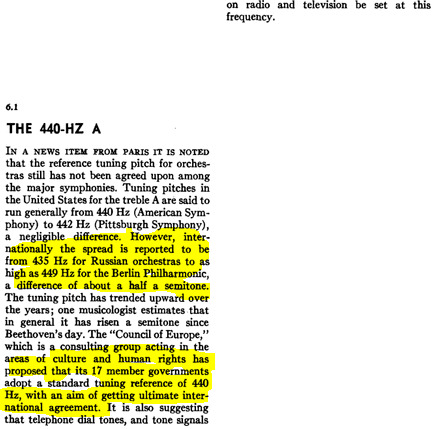
[Note that ISO reformalized ISO 16 as A440 Hz in 1977. A coincidence?]
So here is where I found the most useful reasoning behind the continuing push by the U.S. to make everything based upon 440 Hz. It is because of warfare and communications. This is the punchline to the whole thing.
I found out that starting way back around 1949 the U.S. government was looking at which frequencies were best for different broadcasting needs. Assuredly, these all had to do with military and espionage usage There is evidence that they believed 440 and 600 to be the best for delivery of communication tones (audible). It is not a huge leap to assume that this belief also drove a campaign to enforce the standard on the world. The organization to look at is NOT ISO but rather, NIST (U.S. National Institute of Standards.) And, in hindsight, this makes complete sense to me. NIST would drive all U.S. standards especially as pertains to radio broadcast and military.
Here is an example of such a document. I misplaced the one that originally capped my discovery. But this is a representative similar document. And this one, too.

In fact, to this day, there is a growing stack of documents that describe how and why 440 Hz is used as the standard for synchronization tones. It’s the tone that is used when we listen to NIST WWV timeclock at the top of the hour. The reason is that this tone is apparently what was believed to be the best (least-lossy) audible tone frequency.
So possibly, the push to deliver a hard 440 Hz standard had something to do with 1949 -1960 thoughts on best possible audible tone over radio. It sure seems that way. And it is definitely the common NIST mantra since 1960. See the end of this doc for oodles of examples:
https://tf.nist.gov/general/pdf/1969.pdf
One parting thought on the A440. While researching this I found a whole bunch of crackpot theories about A432 being some sort of universal vibration. A432 is just another of the possible frequencies one could choose as a standard. And, indeed it was in the mix of options over the centuries this has been fraught. If you wanted to tune to any frequency that you want, you could. Who gives a darn? And just because 432 was used by someone for some reasons long ago doesn’t necessarily mean that it is “better”. It is a fixed tone used to derive other relative tones in music. So it really doesn’t matter until or unless you get all freaky-deaky about the differences in relative microtones for western scales. And if you care that much, 432 doesn’t solve all of those issues anyway.
All I can say is that it made me feel a bit better about myself seeing that others are more nonsensical about their 432 Hz desires than I was about my historic research. I thought I was wasting MY time doing all of this research. But think of all the wasted energy surrounding this sort of notion and the other various conspiracy theories about various pitches being part of betterment of life.
Next post will be about those other amazing discoveries associated with The Treaty of Versailles. cars, birds, and sulphur matches up next. Those side discoveries were the best part of it all.
1 note
·
View note
Text
Did The Republicans And Democrats Switch
New Post has been published on https://www.patriotsnet.com/did-the-republicans-and-democrats-switch/
Did The Republicans And Democrats Switch

The Ideology Of Old Democrats And Modern Republicans
Why Did the Democratic and Republican Parties Switch Platforms?
Andrew Jackson was a southern states rights;populist;and;Jacksonian Democrat, which is similar to todays socially conservativelibertarian.
Early factions;like Jeffersonians;and the Young America movement;were rather progressive. The Copperheads and;War Democrats;in the North were;non-Confederate conservative factions during the Civil War. A;Bourbon Democrat is essentially a Libertarian. Thus, we can say the pro-states rights;Democrats of Lincolns time;held both the beliefs of their predecessors the;Anti-Federalists;and;Democratic-Republicans, and those;of;todays;modern Libertarians and;Republicans.
Compared to their opposition the above major;parties;are roughly;pro-south, pro farmer, pro-state-power, anti-central-bank, anti-debt, and anti-taxes. They tend to;favor;individual rights over collective rights, typically choosing deregulation over;government;enforced social justice. Thus, they are;liberal regarding;authority but conservative in terms of social policy. They are, as a party, classical liberals and social conservatives. Today they might be called;neocons, libertarians, and;paleocons.
TIP: Want to understand modern Republicanism? See this documentary on the Tea Party.
The Rise Of Modern Social Liberalism And Social Conservatism
Later we get a third way with Bill Clintons New Democrats. This third way is an extension;of the;progressive bourbon liberal wing, but mashed-up with the progressive social liberal wing, and Reagan-era;conservatism. These three social liberal ideologies which Clinton embodied can collectively be referred to as an;American liberalism. These factions, which we can today denote as;progressive, neoliberal, and social liberal, can be used to differentiate types of liberals on the political left from the New Deal Coalition and the modern Democratic party of today.
TIP: As noted above in the introduction, there is no one way to understand Americas political ideologies, but each angle we look at things from helps us to better understand;bits of the historic puzzle.
How Can We Tell What Switched If Anything
If we want to more accurately see what is happening with the parties we have to look at each political, party, faction, and platform in regards to each issue. We can take any;issue, from any;major American political party platform over time, and see how it compares to other issues of other parties. This can help us see how parties like;Federalists, Whigs, Republican-Democrats,;Democrats, Republicans, Libertarians, and Progressives;did or didnt change over time, and what that means in perspective.
Below is a chart we created showing one way to view the complex political left-right spectrum;.
A left-right paradigm using a four point graph to show how common government types relate to left and right in terms of who has authority and who says so.
If one had to place historical figures on the left and right, in terms of the chart presented above , then VERY loosely we might say:
Right Wingers: Hamilton , Cleveland ,;Hoover, , Reagan
Left Wingers: Jefferson , Lincoln , Teddy;Roosevelt , FDR , Johnson
If one had to place historical figures on our more complex 4-point spectrum, then VERY loosely, but more accurately than above, we might say:
Again, we find that party names are spread out over political leanings;. From here forward we will focus on telling the history of each Party System;in detail, discussing platforms and political views to better illustrate the changes.
Recommended Reading: Trump Interview People Magazine 1998
The Conservative Coalition Vs The New Deal Coalition
Now that we know the basics, the changes in both parties in the 1900s are perhaps best understood by examining;the Conservative Coalition;and the New Deal Coalition.
The Conservative Coalition was a coalition between the anti-Communist Republicans like Nixon and Reagan and conservative Southern Democrats. It arose to oppose FDRs New Deal progressivism, and it blocked a lot of the progressive legislation the New Deal Coalition tried to pass from the 1930s to the 1960s. The socially conservative solid south;was still its own entity. It sometimes voted;with other Democrats, and sometimes broke off into its own factions. See the 1960 election Kennedy v. Nixon v. Harry F. Byrd. The Coalition tellingly dwindled post 64 Civil Rights and ended in the Clinton era as conservative southerners became Republicans and formed;the modern construct of the Red States and the Blue States.
Meanwhile,;the New Deal coalition explains the progressive coalition of Democrats and Republicans the Conservative coalition opposed. Today the two parties largely resemble these coalitions.
Why Were Different Colors Used

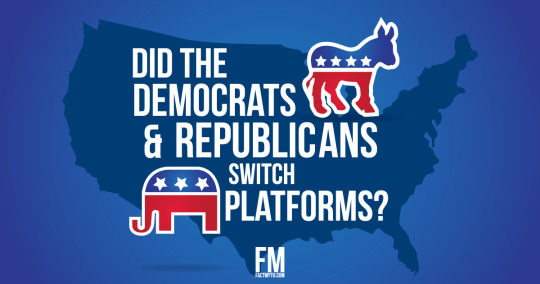
Prior to the 2000s colors were chosen for a variety of reasons. They include:
The flag is Red, White, and Blue. I think we can assume why no one wanted to overtly be the white team.
Every party would try to use;the;color blue as, especially after the Cold War, no one wanted to be RED. Thus, wed often get yellow .
In other cases, red was picked for liberals as that is the traditional international liberal color; blue was picked for conservatives.
Today, when looking at documents produced after 2000, Democrats are typically coded blue. For instance, this color map;of all past elections by state;uses Blue to represent the Democratic Party and Red to Represent Republicans regardless of what color was used at the time.
You May Like: Trump 1998 People Magazine Quote
Better Understanding The Changes In American Politics
Above we summarized the switching of ideologies and platforms;between the parties by looking at the party systems and Presidents.
Below we explore;details, clarify semantics, answer questions, present curated videos, and illustrate some of the key telling moments regarding the changes described above.
Please consider sharing your insight below, our summing up of the history of American politics is an ongoing effort, see the videos for supplemental content from other authors.
For deeper reading:
Also, see a breakdown of each party and President and how they would be placed on the left and right.
This Is Not A New Argument
Princeton University Edwards Professor of American History Tera Hunter told USA TODAY that this trope is a fallback argument used to discredit current Democratic Party policies.
At the core of the effort to discredit the current Democratic Party is the refusal to accept the realignment of the party structure in the mid-20th century, Hunt said.
In September, NPR host Shereen Marisol Maraji called the claim, one of the most well-worn clapbacks in modern American politics.
Comedian Trevor Noah tackled the misleading trope on an episode of “The Daily Show” in March 2016, after two CNN contributors debated the topic.
Every time I go onto Facebook I see these things: Did you know the Democrats are the real racist party and did you know the Republicans freed the slaves? Noah joked. A lot of people like to skip over the fact that when it comes to race relations, historically, Republicans and Democrats switched positions.
A similar meme attributing the claim;to U.S. Secretary of Housing and Urban Development;Ben Carson has been circulating;on social media since November 2016.
Who started the KKK? That was Democrats. Who was the party of slavery? Who was the part of Jim Crow and segregation? Who opposed the Civil Rights Movement? Who opposed voting rights? It was all the Democrats, the meme reads.
Other posts making more specific;claims about the Democratic Party;starting the Civil War or founding the KKK continue to circulate.
Recommended Reading: Did Republicans Cut Funding For Benghazi
Other Factors Of Note Regarding Switching Platforms Progressivism The Red Scare Immigration Religion And Civil Rights In 54
Other key factors involve;the Red Scare , the effect of immigration, unions, and the Catholic vote on the parties.
The Republican party changed after losing to Wilson and moved away from progressivism and toward classical liberal values under Harding, Coolidge, and Hoover. In this time they also became increasingly anti-Communist following WWI . While both parties were anti-Communist and pro-Capitalist, Wilsons brand of progressive southern bourbon liberalism and his New Freedom plan and then FDRs brand of progressive liberalism and his New Deal were opposed by Republicans like Hoover due to their;use of the state to ensure social justice. Then after WWII,;the Second Red Scare;reignited the conversation, further dividing factions and parties.
Another;important thing to note is;that the Democratic party has historically been pro-immigrant . Over time this;attracted new immigrant groups like Northern Catholics ;and earned;them the support of;Unions;. Big City Machines like Tammany Hall;also play a role in this aspect of the story as well. The immigrant vote is one of the key factors in changing the Democratic party over time in terms of progressivism, unions, religion, and geolocation , and it is well suited to be its own subject.
Despite these general;truisms, the parties themselves have typically been factionalized over;complex factors relating to;left-right ideology, single issues, and the general meaning of;liberty.
Southernization Urbanization And Big Government Vs Small Government
Did the Republicans and Democrats switch Platforms?
Today the Republican party doesnt have a notable progressive left-wing and the Democratic Party doesnt have a notable socially conservative right-wing.
Instead both parties have establishment and populist wings and the parties are divided by stances on social issues.
In other words, regional interests and the basic political identities of liberal and conservative didnt change as much as factions changed parties as party platforms changed along with America.
The modern split is expressed well by;the left-right paradigm Big Government Progressivism vs. Small Government Social Conservatism, where;socially conservative and pro-business conservative factions banded together against socially liberal and pro business liberal factions, to push back against an increasingly progressive Democratic Party and America .
This tension largely created the modern parties of our two-party system, resulting in two Big Tents;who disagree on the purposes of government;and social issues. This tension is then magnified by the;current influence of media and lobbyists, and can be understood by examining;what I call;the Sixth Party Strategy and by a tactic called Dog Whistle Politics).
The result is that today the Democratic Party is dominated by liberal Democrats and Progressives.
Meanwhile, most of those who would have been the old;socially conservative Democrats now have a R next to their name.
Just look at;the 115th United States Congress under Trump;.
Read Also: Is The Media Biased Against Republicans
The Bottom Line On The Party Switch
The parties changed over time as platform planks, party leaders, factions, and voter bases essentially switched between parties.
Third parties aside, the Democratic Party used to be favored in the rural south and had a small government platform , and the Republican party used to be favored in the citied north and had a big government platform .
You can see evidence of it by looking at;the electoral map over time;. Or, you can see it by comparing which congressional seats were controlled by which parties over time . Or, you can see the big switch specifically by looking at the electoral map of the solid south over time. Or, you can dig through;the historic party platforms.
With that in mind, we can sum up the history of the switches that created the modern party system as:
The old southern conservative Democrats, a big faction of voters called the solid south who were in Jeffersons anti-Federalist coalition, have essentially today changed parties and teamed up with the old Republican party of Lincoln .
Meanwhile, Teddys progressive faction essentially switched as well starting after Teddys run as a Bull Moose in 1912.
Generally then, the Democratic party started moving toward progressivism and the Republican party starting shifting more toward the conservative right from Harding forward, and this in turn changed the parties .
Also Check: How Many Republicans Voted Against Budget
Fourth Party System: The Progressive Era Mckinley And Teddy 1896 1932
The election between;Theodore Roosevelt;William McKinley was pretty heated;over social issues, but the parties stay the same. Republican Theodore Teddy Roosevelt is arguably the last of the left wing Republicans. Roosevelt;is;a very progressive president, and he even started his own progressive party after breaking away from the Republicans. The parties are more or less still the same as they were since the split over reconstruction, but the lines are much less clear due to the changing tides of the time.
Don’t Miss: What Have Republicans Done For The Middle Class
A Quick Summary Of How The Major Parties Changed And Switched With Some Visuals
Above was an overview of the main points, below is a more detailed;summary of points that will help one understand the party switches of the different party systems. After the summary are some images and videos which help tell the main points of the story:
Also consider the following general notes about the party platforms in any era:
Northern City Interests : Federalists, Whigs, Third Party Republicans, Fourth Party Progressive era Republicans , Fifth;Party Democrats , Modern Democrats.
Southern Rural Interests : Anti-Federalists, Democratic-Republicans, Third Party Democrats, Fourth Party Progressive Era Democrats , Fifth;Party Republicans , Modern Republicans.
NOTE: Saying there is way too much ground to cover to say it all in a consumable bite is an understatement, so if you are looking for specifics use command find or our site search.
TIP: The Confederates wanted free-trade and states rights, meanwhile the northern Republicans wanted a debt-based economy with modernization and protectionist trade. Things have changed considerably, but not every plank changed. What happened was complex.
Below some images that might help tell the story without me even having to say another word:
A map showing realigning elections and Presidents who represent major changes in the U.S. parties. We can see something happened, that is empirically undeniable, but what?
An Overview Of Platform Switching In The Modern Era From Lbj To Today


The;growing tension between progressive southern Democrats and social conservative southern Democrats came to a boil;with 1954s;Brown v. Board of Education. This Supreme Court ruling;led to divisive issues like;Desegregation busing;causing further splits in the Democratic Party, which Republicans capitalized on as;they did under Hoover.
Tellingly, progressive Southerners like;Albert Gore, Sr.;,;Estes Kefauver,;Ralph Yarborough, and;Lyndon B. Johnson;;refused to sign 1956s;Southern Manifesto;.
By the 60s, the tension was mounting around;LBJs;Great Society programs;;specifically 64s Civil Rights. Some conservative Dixiecrats like;Strom Thurmond began to leave the Democratic Party for the Republican Party and;the George Wallace-led American Independent Party. .
Other;southern politicians and voters followed Strom Thurmond over time. Their exit left the now social-liberal ;Democrats;to support the;increasingly socially conservative Republicans under Goldwater-Reagan-Nixon. The southern strategy these leaders developed was continued into the 80s under;Lee Atwater, and even extended;into the 2000s).
In the transition period of the mid-to-late 60s, progressive Democrats and Republicans usually carried the less progressive Dixiecrats and Republicans on social issues like;Voting Rights 65;and;Civil Rights 68,;but over time, as the Republicans moved further to the political right, this became increasingly less true.
Also Check: How Many Registered Republicans In The Us
Choosing Who To Vote For
Douglas was right. As citizens we must vote righteously. And by the way, this first assumes that we are voting. This responsibility to vote and to vote righteously has been made clear from generation to generation.
Once such a voice heralding this responsibility was that of Charles Finney. Finney was a famous American revivalist, a leader in the American revival movement called the Second Great Awakening.
He was also the president of a college that even decades before the Civil War admitted both black and white students as equals. In fact, the students from the college where Reverend Finney was president not only became some of the most active conductors of the underground railroad but also started several of Americas black colleges and universities.
Reverend Finney wisely admonished, The time has come that Christians must vote for honest men and take consistent ground in politics. Christians have been exceedingly guilty in this manner but the time has come when they must act differently. Christians seem to act as if they think God does not see what they do in politics but I tell you, he does see it. And he will bless or curse this nation according to the course Christians take in politics.
Recommended Reading: Why Do Republicans Want To Get Rid Of The Epa
The Myth Of The Republican
When faced with the sobering reality that Democrats supported slavery, started the Civil War when the abolitionist Republican Party won the Presidency, established the Ku Klux Klan to brutalize newly freed slaves and keep them from voting, opposed the Civil Rights Movement, modern-day liberals reflexively perpetuate rather pernicious myth–that the racist southern Democrats of the 1950s and 1960s became Republicans, leading to the so-called “switch” of the parties.
This is as ridiculous as it is easily debunked. ;;
The Republican Party, of course, was founded in 1848 with the abolition of slavery as its core mission. Almost immediately after its second presidential candidate, Abraham Lincoln, won the 1860 election, Democrat-controlled southern states seceded on the assumption that Lincoln would destroy their slave-based economies.
Once the Civil War ended, the newly freed slaves as expected flocked to the Republican Party, but Democrat control of the South from Reconstruction until the Civil Rights Era was near total. ;In 1960, Democrats held every Senate seat south of the Mason-Dixon line. ;In the 13 states that made up the Confederacy a century earlier, Democrats held a staggering 117-8 advantage in the House of Representatives. ;The Democratic Party was so strong in the south that those 117 House members made up a full 41% of Democrats’ 283-153 advantage in the Chamber.
So how did this myth of a sudden “switch” get started?
It would not be the last time they used it.
You May Like: Who Said Democrats Want To Exterminate Republicans
History Of The Democratic And Republican Parties
The Democratic Party was founded in 1828, while the Republican Party was founded in 1854.;
;You can trace the historical backgrounds of these two parties back to their Founding Fathers.
The United States founding fathers had different political beliefs. The contrasting political views eventually led to the formation of two parties.;
The political view of George Washington, Alexander Hamilton, and John Adams was to have a powerful government. Therefore, they wanted a government with a national bank and a central banking system. Hence, their unique banking system ideas birthed the Federalists party.;
In contrast, Thomas Jefferson and James Madison had different political ideologies. They wanted a political system where they can advocate for a minimal, more decentralized approach. With their decentralized government views, they founded the Democratic-Republicans party.
Also Check: What If The Republicans Win Everything Again
0 notes
Photo





((Oh cool I love talking about muses weaknesses and fears in front of a bunch of people who totally don't want to use those against them. I've been putting these off for FAR too long, here's a masterpost of all the muses fears, weaknesses, and addictions. HCs under the cut ;P))
Things that apply to all the toons: They all have to be afraid of water, acetone, and religious symbols/items. Those things can literally kill them, they count as both a fear and a weakness. There's also a learned fear that only comes into play in another 70 years after everyone from the original crew has died: they start to fear befriending people because they know they're effectively immortal, and losing people hurts like hell and they don't want it to keep happening. Bendy legitimately tries to get Henry to toon-himself in an effort to stop him from dying, he was the last one from the original group alive and none of the toons wanted to see him go. When he declines it leads to an argument, and it was a very emotional argument because the fear of loss was very real. You'd think loss would get even a little easier after its happened enough times? You... would be incorrect.
Bendy: I've listed off Bendy's fears before, being forgotten and fading into obscurity are big ones. The studio never falls in this AU but it does take some small dips, and that terrifies him. Also, skeletons. Skeletons are scary. For addictions, I wouldn't necessarily say he's addicted to bacon soup? But he does love it... a little too much. You can bribe him with it even though it's readily available at any given moment. Bendy's also the idiot child that begs everyone to watch a horror movie, only to end up terrified and up all night because he's jumping at every shadow or creak of the building.
Boris:
Boris is braver than Bendy, but he’s still afraid of a good number of things. Sudden loud noises, cars, things that lurk in the dark, the dark itself, monsters, Spooky Things (October is not a fun month for him), spiders, and he shares Bendy’s fear of thunderstorms... he might be a wolf, but he’s a big scaredy-cat :P He’s afraid of way more things that he hasn’t even encountered yet. Weaknesses? Objects being thrown, specifically ball or stick shaped objects. He will always, without fail, run to retrieve it for you. He hates himself for it.
Alice: Nobody’s quite sure why or how, but because Alice was based on her voice actress she’s picked up a few personality traits and opinions from her. Fears are not an exception, and Alice shares Susie’s fear of war and violence and her fear of heights despite not being able to be hurt from falling large distances. She’s also afraid of losing form and shape-shifting too much from her original design, she likes staying the way she is and not having a stable form is weird and gross-feeling. Remember how all the toons are afraid of water and anything else that’ll make them melt? She’s afraid of it the most.
Joey: One of Joey's strong points is also one of his weak points, and that's his need to do the impossible. This does lead to him pushing boundaries and sometimes entirely destroying said boundaries, and he absolutely hates giving up so it'll take him a really long time to get his focus off trying to Do The Thing. Even then he never directly says he gave up on something, he says he shelved it. This stems from a strong fear of failure and not being in control, and the need to accomplish more and more as he knows he's getting older and he wants to achieve as much as possible. The studio's not in any danger but he goes above and beyond trying to make sure it stays that way, because losing his life's work is his biggest fear. Also, he's really paranoid. It's why he doesn't leave the studio too often, doesn't have a lot of friends, and forces the toons to stay inside for years. He's afraid of heights and flying too.
Also, Henry may not get drafted in this AU (I HC that he does in the main game, which is what pulled him from the studio) but that’s by sheer luck. When the US got involved in WWII and people started getting drafted, neither of them knew if Henry would be among them, and Joey was utterly terrified that he would be. Henry picked up on it but never said anything.
Henry: Henry's probably the most fearless of everyone, his biggest fears are falling behind and being a disappointment. Demons and witchcraft would be scarier if he wasn't exposed to it on a daily basis, he found them a lot more unnerving when Joey first starting messing with them but now its just a part of life. His workaholic habits partially come from the first fear, he knows he's super lucky to basically be HANDED this job (his dream job) and he really doesn't want to let anyone down, especially not Joey. As someone who values security he also fears death, not so much his own but the sudden death of his friends, family, and other important figures in his life. He's also got an acute fear of storms, but he doesn't get nearly as afraid of them as Bendy or Boris. Sometimes said toons huddle under his desk while he works when it storms, and Henry talks to them and tells stories so they can all feel more calm. Weaknesses and addictions? Caffeine.
Sammy: Right off the bat I can tell you Sammy's got a bad nicotine addiction. That's not a surprise to anyone. He starts getting antsy pretty quick if he tries not to smoke, and if he's already stressed out it only happens faster. He's terribly dependent on his cigarettes, they help his anxiety. He's also afraid of large crowds of people, which is why he prefers to go out later in the day and doesn't like going to studio events and parties. He usually has to anyway, but he doesn't like them and sticks close to Susie when he does. He doesn't like flying either, and he's afraid of something happening to Susie. If she ends up in trouble he will literally do anything to make sure she stays safe. He's not so much afraid of rodents as he is half-afraid, half-disgusted by them. He still jumps onto a chair or desk if one comes near him though.
Susie: Susie might be able to defend herself, but she's by no means unstoppable. She's afraid of walking around the city after dark alone (she’s afraid of being alone in the dark in general, as a kid she was afraid of the dark itself and it never entirely left her), if she misses the trolley she'd rather crash at Sammy's place than make the long and dangerous walk home. War is also terrifying to her, everything about it is upsetting - the unstable political nature of it, the way thousands of people are shipped out to fight and a lot of them don't come home, and their poor families... the ones that do come home, they're never the same. It's nothing but a terrible thing. Her dad is a vet from the great war (WWI) and she remembers being a kid, worried with her mum and older brother and sister about whether or not he'd come home. She's terrified of another war breaking out, and even more terrified about the people she cares about getting sent out and possibly dying. Also heights. Fuck heights. She's the most terrified of heights out of everyone at the studio.
Wally: Wally absolutely cannot stand being alone for more than maybe three minutes, and he hates small spaces (claustrophobia) and being trapped anywhere. He rarely closes a door behind him and if someone else closes the door he will immediately drop what he's doing to reopen the door. If the door is somehow locked, that's what he has his keys for - if he loses his keys as he so often does, or he can't pick the lock... he might literally kick down the door, or at least break the lock. He's also afraid of commitment (hence why he doesn't like starting romantic relationships, and when he does they fail within a month) and he's very dependent on money, because money is security and he grew up in the depression with six siblings and exhausted parents and he doesn’t want to be that poor ever again. He'll do almost anything to make a quick buck.
Norman: In his age he's gotten over a lot of fears, but if there's two things he'll be afraid of until he dies its bugs and the paranormal and otherwise unknown. Bugs make his skin crawl, and the paranormal and unknown... well, it's unknown. There's all kinds of spooky shit going on there. You can probably figure he wasn't too happy to hear Joey was messing around with witchcraft and demonic rituals, he actually almost quit when he did. A pay-raise and some convincing later, he pushed his worries aside - he only half regrets that decision now.
Shawn:
Shawn’s also a bit of a scaredy-cat if you can believe it. He screams at sudden loud noises, gets quickly unnerved at weird shadows out of the corner of his eye, and hates being in total darkness. Both the “not being able to see his surroundings” and “not being able to see what might be lurking in his surroundings” aspects of that last one really get to him, he always sleeps with the bedroom curtains open to let the moonlight in. His wife had to make a rule for how many stuffed animal comfort objects he’s allowed to have on the bed at once. Tell him a decent enough scary story and he’ll have trouble sleeping for a couple days. He’s a bit of a mess.
Thomas:
Thomas isn’t afraid of much, actually. It’s a perk to being mostly emotionally dead. He’s afraid of losing his dog, abandonment, and snails. Snails are just gross. Slugs are even worse. He’s not gonna scream if he sees one, he just really hates them.
#batim#bendy and the ink machine#bendy the demon#boris the wolf#alice angel#joey drew#henry batim#sammy lawrence#susie campbell#wally franks#norman polk#headcanons#ask#lyra109-dreemurr#anonymous#anon#zgd-raiko#roboticdragons#i only know so many fears off the top of my head but if anyone wants to share fear HCs feel free to drop them in my inbox#and I might add 'em#I know I've passively mentioned some character's fears in other asks but I've answered so many asks I don't remember them all#so if I said 'x is afraid of y' and its not in here let me know#odds are I just straight up forgot it#these are a little sloppily-written :P#shawn flynn#thomas connor
125 notes
·
View notes
Text
Adventure #9 → June 16 & 17: Berlin to Wachau: walls, stadiums, and a mini-castle Airbnb

June 16 - Berlin (Day 1)
We were in a bit of a time crunch to get to the Berlin airport on time because my dad had decided to sit there while we got ready and only started to get ready once we said that we were going to be late if we didn’t leave right away. This meant that he was rushed to get ready and was driving angry, which can be really scary. Did I fear for my life as we sped down the autobahn? Most definitely. Eventually, he calmed down enough that I was able to fall asleep and woke up as my parents tried to find the parking garage that we would be dropping the car off. When we finally dropped off the car, my sister and I spotted my cousin, Joy, looking around trying to spot us, and as soon as she and I locked eyes, we ran to each other and met in a joyful embrace. Not long after, my parents pulled up with my aunt, Vicky, in the new rental and we packed everything up in a game of luggage Tetris. What was a 7-seater van turned into a cramped six-seater with me crammed in the back next to all of the luggage,
From the airport, we drove in the direction of the hostel that we would be staying at, stopping for burgers on the way there. I was so excited to be reunited with my best friend/cousin and for the rest of the trip, she was truly my travel buddy. After eating, we headed straight to the hostel, right in front of the wall in what used to be East Berlin, and dropped off our luggage before heading back to the center of the city to go to Checkpoint Charlie.



Checkpoint Charlie was established in August of 1961 to prevent citizens of East Germany from fleeing to West Germany and operated for almost 30 years. It was the only gateway in East Germany where Allied diplomats, foreign tourists, and military personnel were allowed to enter into communist Berlin. The Allies placed military police there to make sure that their officials had access to the border. The small guardhouse was a way for the Allies to show the communists that they didn’t think the Berlin Wall was an actual border or that it would be a permanent fixture. When the wall fell in November 1991, people from East Germany flooded through the checkpoint.
Across the street was a little outdoor museum about Checkpoint Charlie and the Berlin Wall. It told the story of the Wall and recounted stories of people who were killed trying to cross from East to West. It also had the section of the wall that served as the entryway from West Berlin to East Berlin. There was a stark difference from the West side (graffitied) and the East side (plain).

From Checkpoint Charlie, we walked to the Memorial to the Murdered Jews of Europe 20 minutes away. German parliament decided to build this a central memorial site in 1999 to honor those killed in the Holocaust during WWII. The memorial itself wasn’t anything that artistically jumped out at you but the meaning behind what it was built in memory of was what struck you and sobered you. Walking through rows and rows of slabs of concrete built on a sloped wave, I thought of all the people who were suffered in that war, tortured, starved, punished for their race, murdered. I was reminded of the cruelty of humans and rampant sin and just how much the world needs Jesus.

From the Memorial to the Jews, it was a short walk to Brandenburg Gate and just a little further, the Reichstag Building. Brandenburg Gate was built in 1791 and during the Cold War, it became a symbol of a divided Berlin because it stood between East and West Berlin. This “gate” is where Ronald Regan gave his speech in 1987, telling Gorbachov to “tear down this wall”. When the Berlin Wall fell, the gate became a symbol of unity for New Berlin.
There were so many tourists when we were there, and while it was clear that we were trying to take pictures, people simply didn’t care. So we did what naturally made sense and blocked those people out of the picture with our hands. While we were annoyed, we made light of the situation with a classic cousin move of silliness.

We walked to the Reichstag Building less than 5 minutes away from Brandenburg Gate. It is currently where the German parliament presides and has become an international symbol of democracy because of all the tumultuous history that it witnessed and overcame (WWI&WWII and the Cold War). The building had been burned, shot up, graffitied, and more, enduring the tests of time and war, but was finally rebuilt and restored in 1964; the city has purposely preserved traces of bullet holes and graffiti that were left by Soviet soldiers for visitors to see.

After our time wandering outside of the Reichstag, my dad began to complain about how far we had walked and that we should have brought the car because now we have a far walk back to where we parked. Taking the hint that he was tired and wanted to go rest, we began the short trek back to Checkpoint Charlie where we had parked. From there we stopped by Berlin Hauptbanhof to pick up some groceries for dinner. Grocery stores closed early on Sundays except for ones located in the train station, so of course, when we got there, it was crowded with people trying to buy ingredients for their Sunday dinner. When we finally made it out of there, we headed back to the hotel; my mum and aunt went to go wash our clothes while my dad rested and we girls prepared dinner in the communal kitchen. It was just a simple meal of pasta, salad, and breaded chicken but it took us forever to cook (about 2 hours) because the electric stove would shut off as soon as it reached a certain temperature. It was a mess.
June 17 - Berlin Day 2

We had knocked out almost everything that we wanted to see on our first day in Berlin so after a quick breakfast and checking out, we crossed the street to some of the East Side Gallery before we headed into the main city to see the Berlin Cathedral before going to the Berlin Olympic Stadium.
Unfortunately for us, the Berlin Cathedral, the largest and most important Protestant church in the city, was under restoration so most of the building was covered in blue scaffolding. We were on a bit of a time crunch so we kind of sped around the outside and the surrounding buildings and then hopped in the car to make our way to the Olympic stadium.

For as long as I can remember, my family has always had a love for sports. The Olympics is the only time we pay for cable TV, and wherever we travel, if there is an Olympic stadium or village, we always take the time to go. Berlin was no exception. It was built to host the 1936 Summer Olympic Games during WWII and designed to match the Nazi Party’s styles. This is the stadium that Jesse Owens won gold four times in the presence of Hitler. Since the games, the stadium has been renovated many times and is often used to host sporting events, concerts, and more.


We couldn’t enter the stadium without a guide so after purchasing tickets for the next tour, we entered the arena. Much like St. Petersburg, it was a slew of information as we hopped from one section to the next. We got to see the locker rooms underground as well as areas where athletes could hang out, but the coolest part was what was preserved of the original stadium. On the opposite side of the entrance, there are large stone slabs with the names of the winners of that Olympic Games and from that point, you can see the Bell Tower, which used to contain the Olympic Bell (now displayed outside), and Langemark-Halle. The guide told us that Hitler had given speeches there.


Visiting that stadium was one of my favorite things on this trip. I’ve always loved watching the Olympics and have seen countless documentaries on it. I also love WWII history, so to see both of these things come together, both past and present, it was amazing. When I looked out across the stadium, I imagined in my head what it would have been like to have attended and seen Jesse Owens run or to spot Hitler from my seat or to just witness the political ins and outs of hosting an Olympics during a war. It blew my mind.
When our tour was over, we began the long drive to our Airbnb in Wachau, 3 hours away. In my typical fashion, I slept the whole car ride, but when we did arrive there, we were kind of stunned. From the pictures on the website, the place looked kind of like a castle. It turned out that it was pretty close because our unit was looked like a mini castle, complete with a sword and ax bolted to the wall. That place was by far my favorite Airbnb to have stayed at. Ever. The place was newly remodeled and quite spacious. My only objection was the amount of bugs flying around, but everything else was perfect. From the kitchen window, you had a perfect view of the setting sun, there was an actual freezer in this fridge, and the overall ambiance was just so relaxed and laid back.



After dinner, all of us went on a walk; me with my sister and cousin in the direction of the country roads and my mom and her sister into town. My sister and cousin had taken bikes with them but gave up early 10 minutes later when they realized that these bikes were not in proper riding condition, so instead of walking around, we had ourselves a little photoshoot while watching a gorgeous sunset paint the sky.



Our night ended with bubble baths and wine coolers. It was one of the best days ever.
0 notes